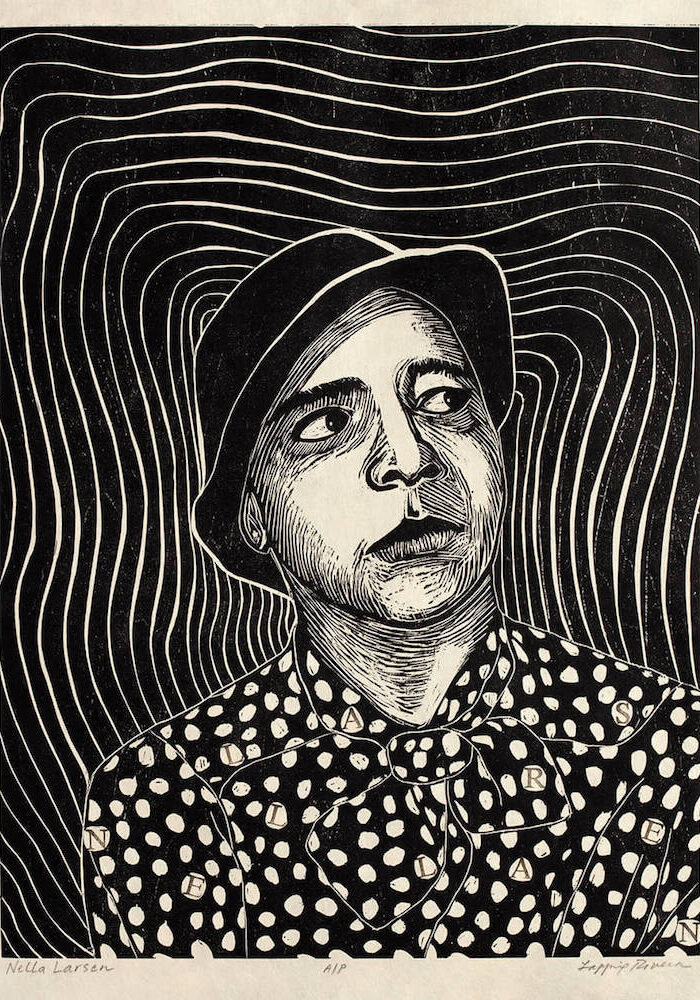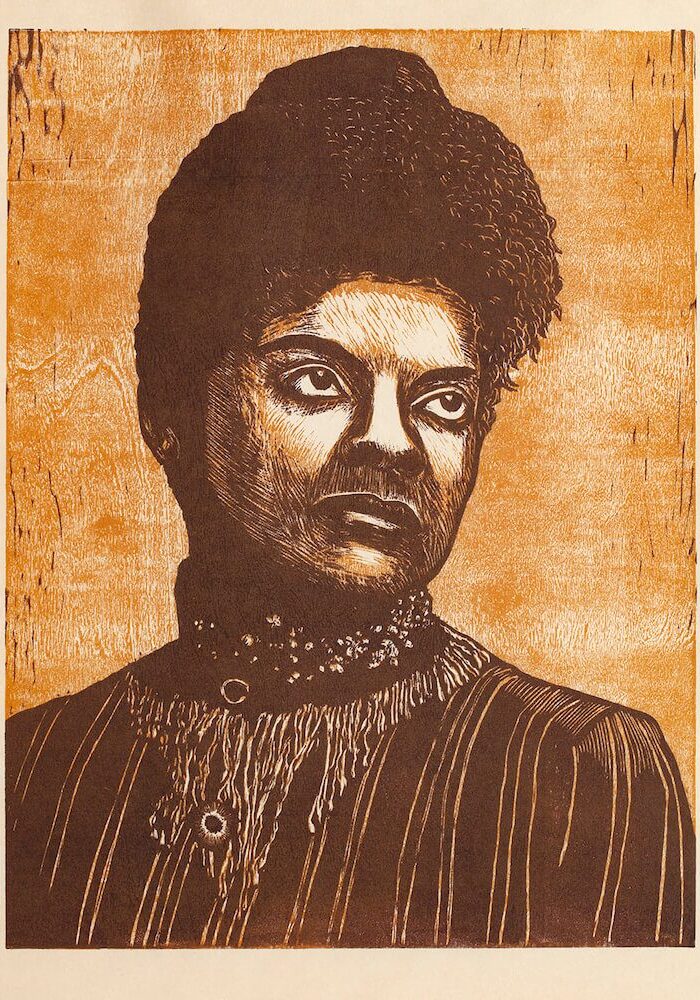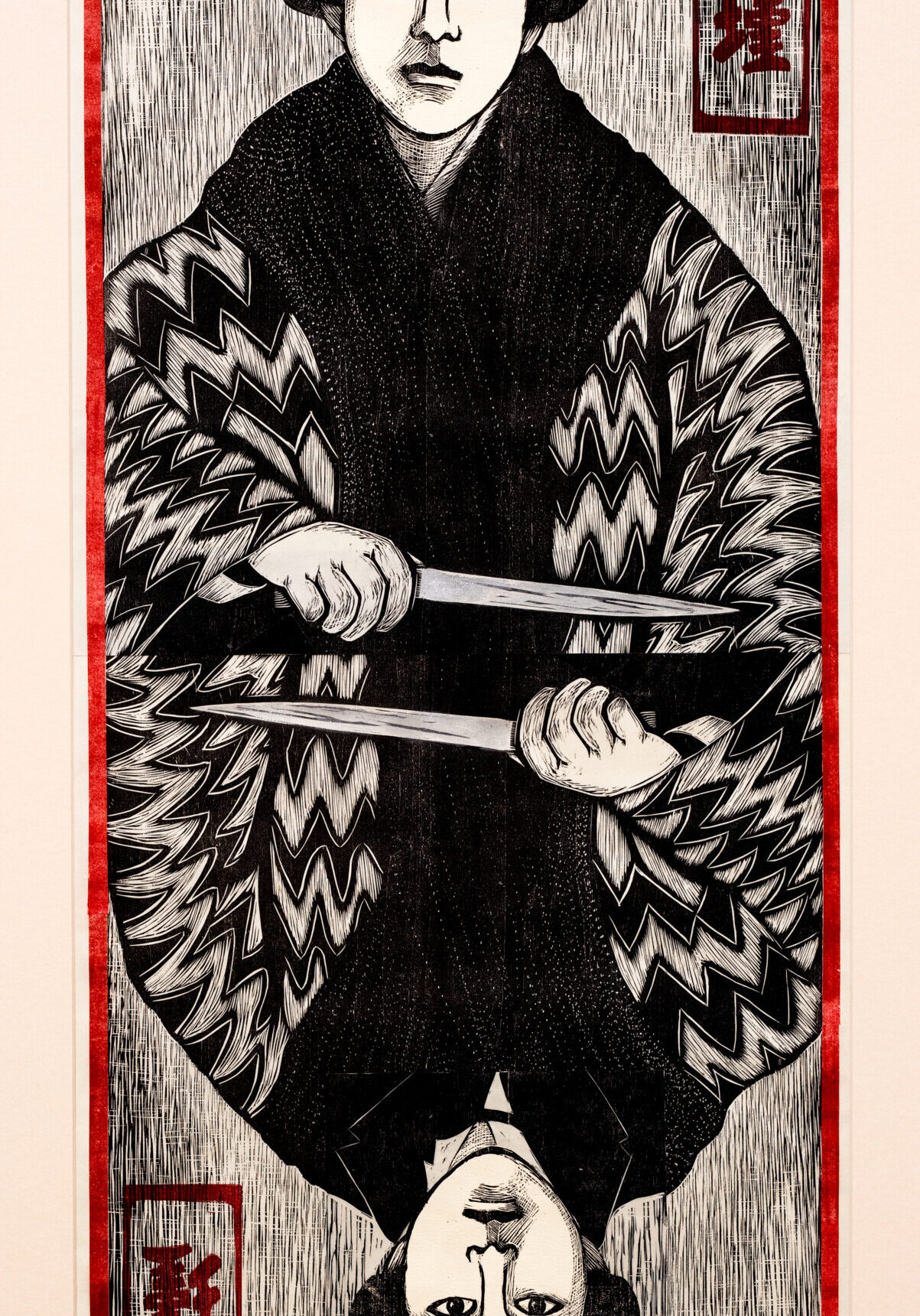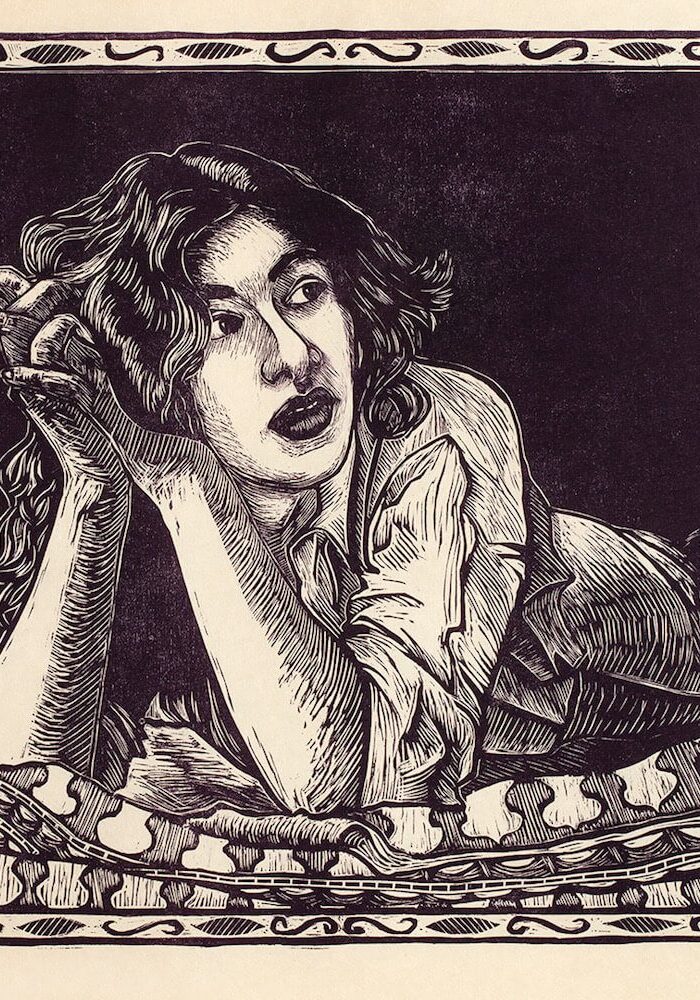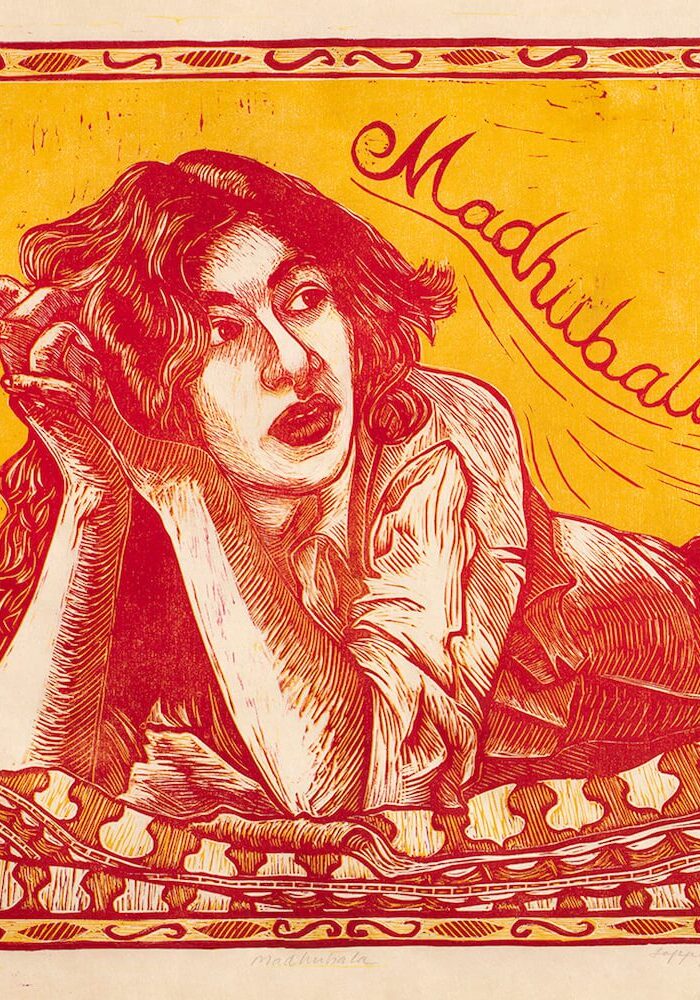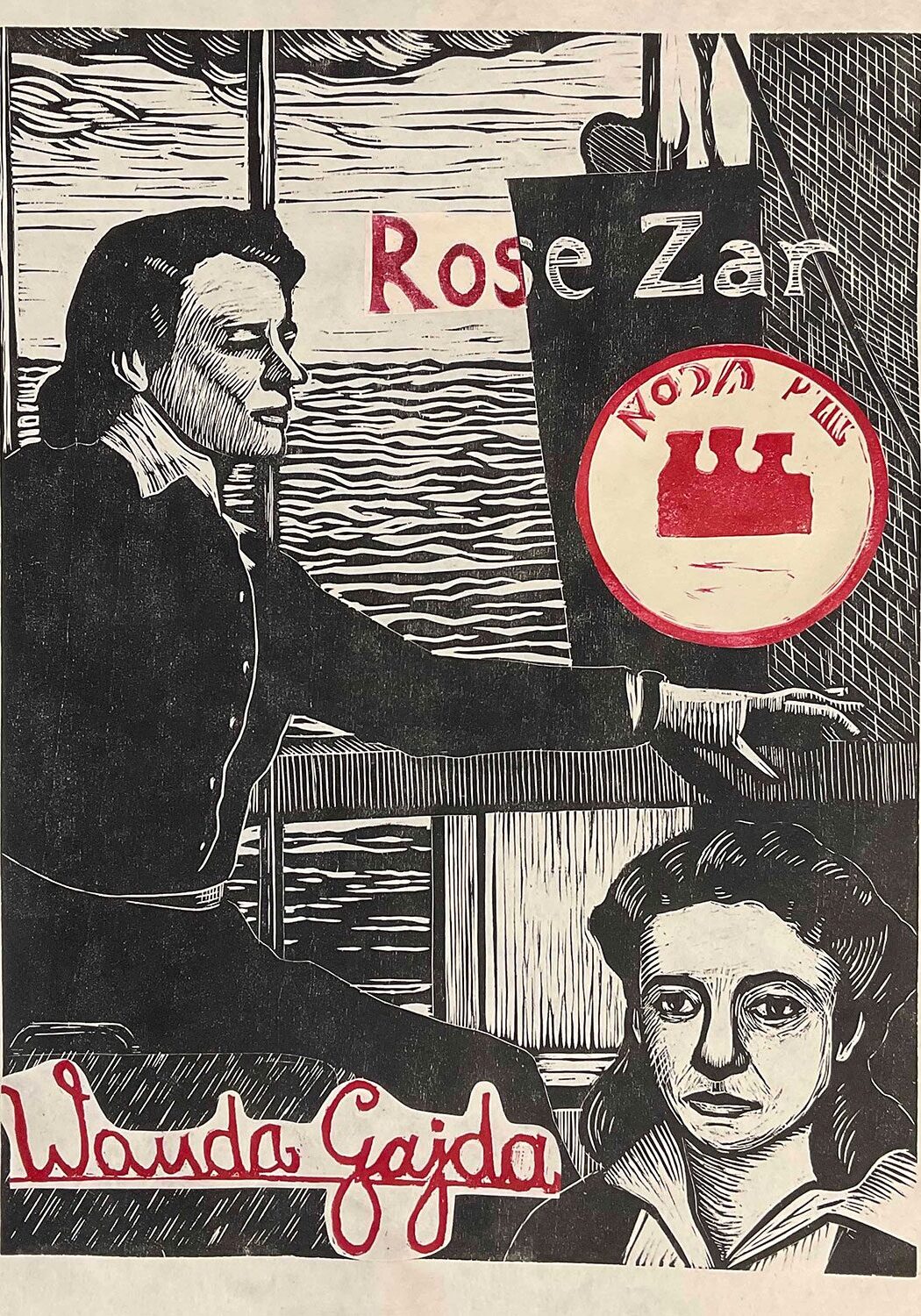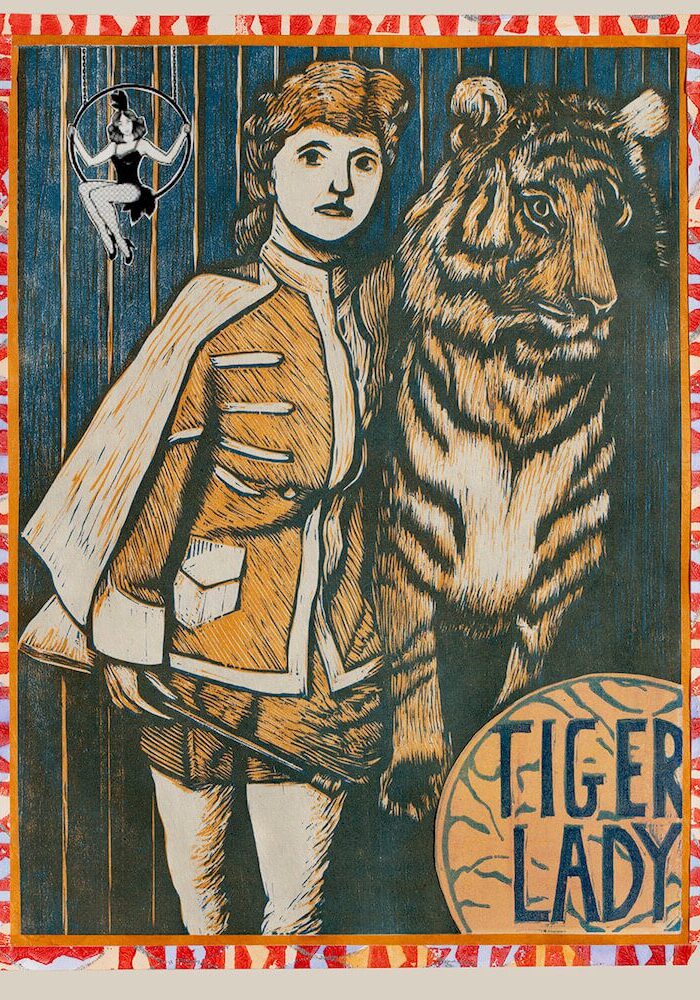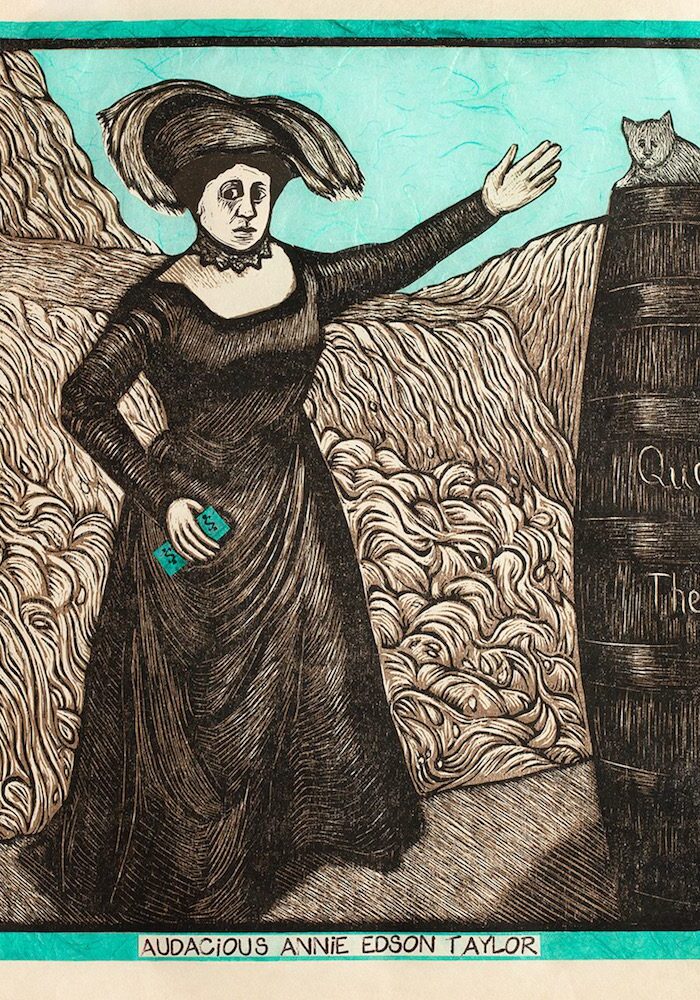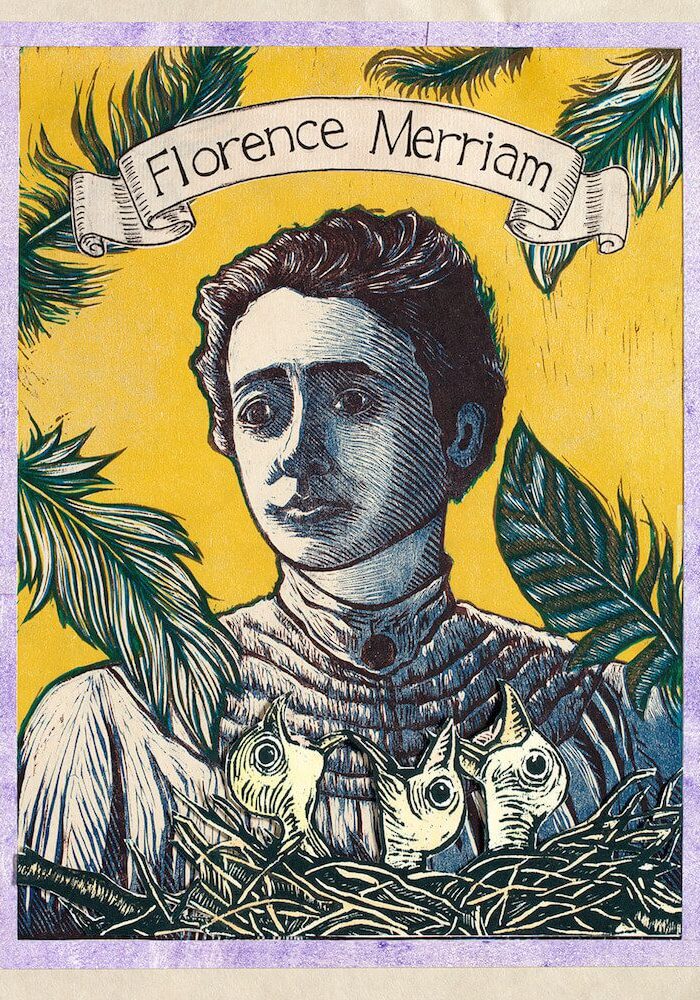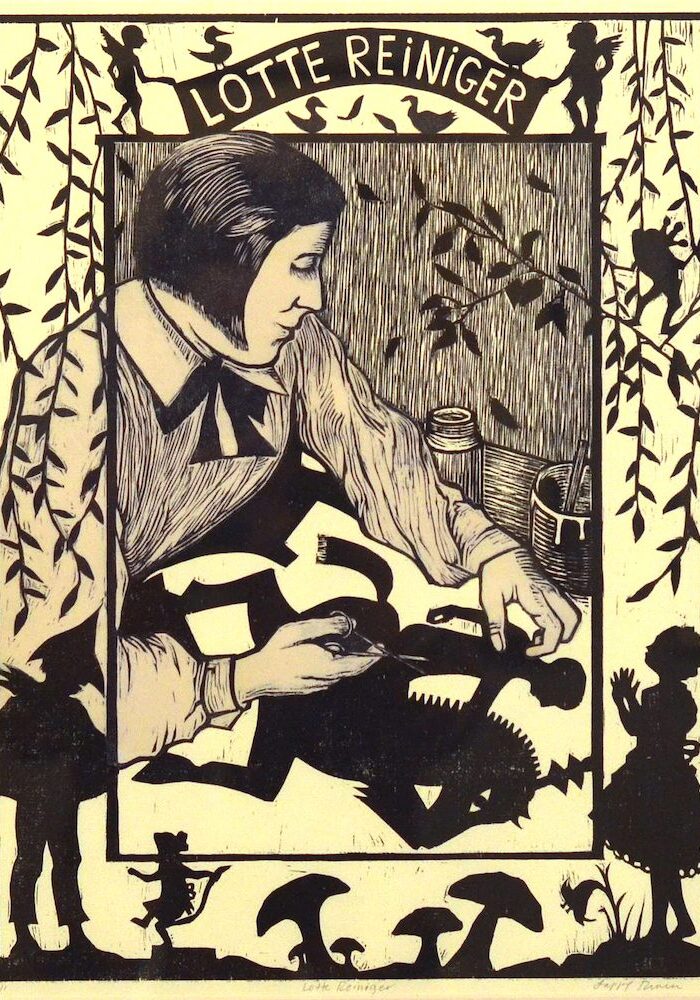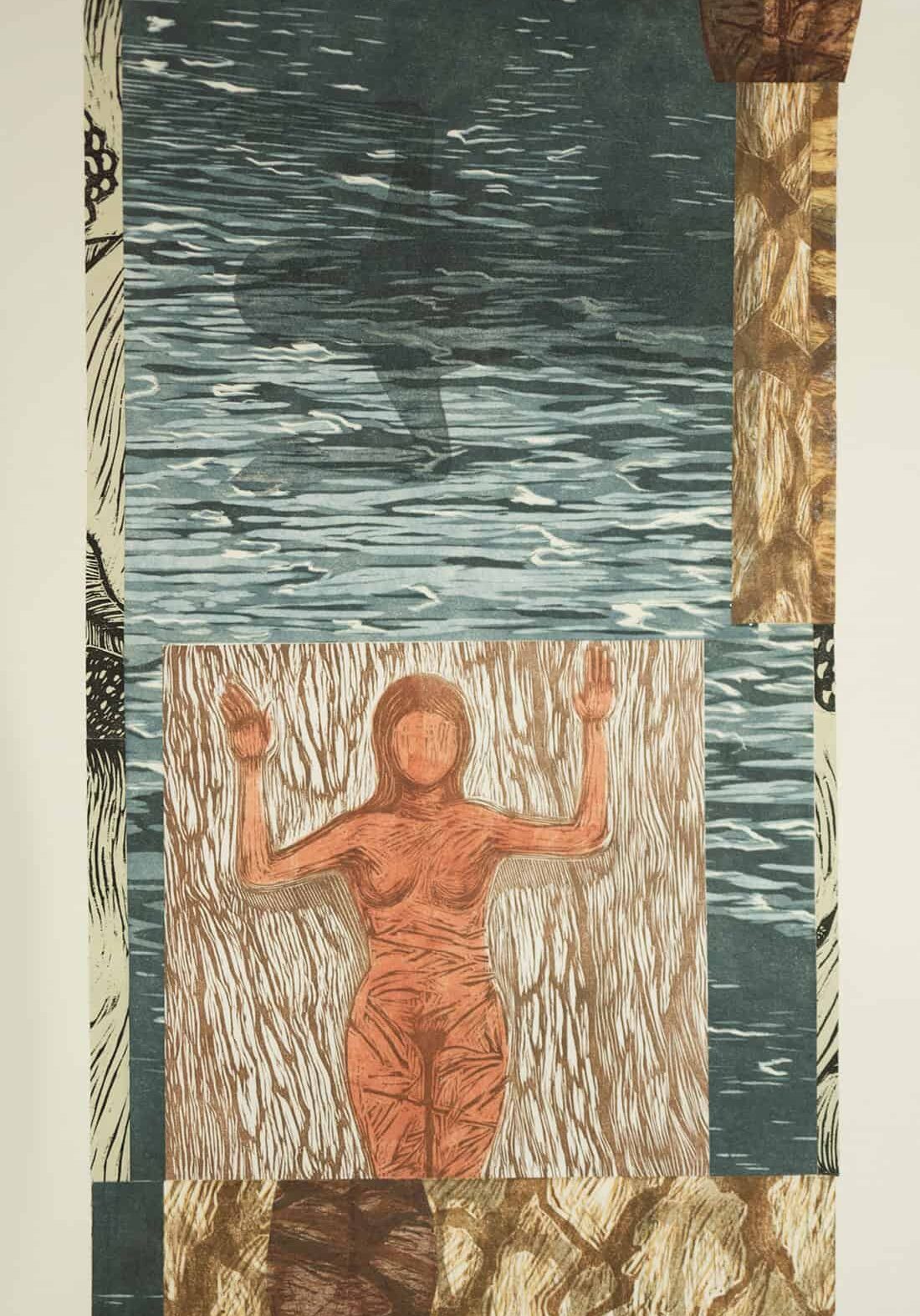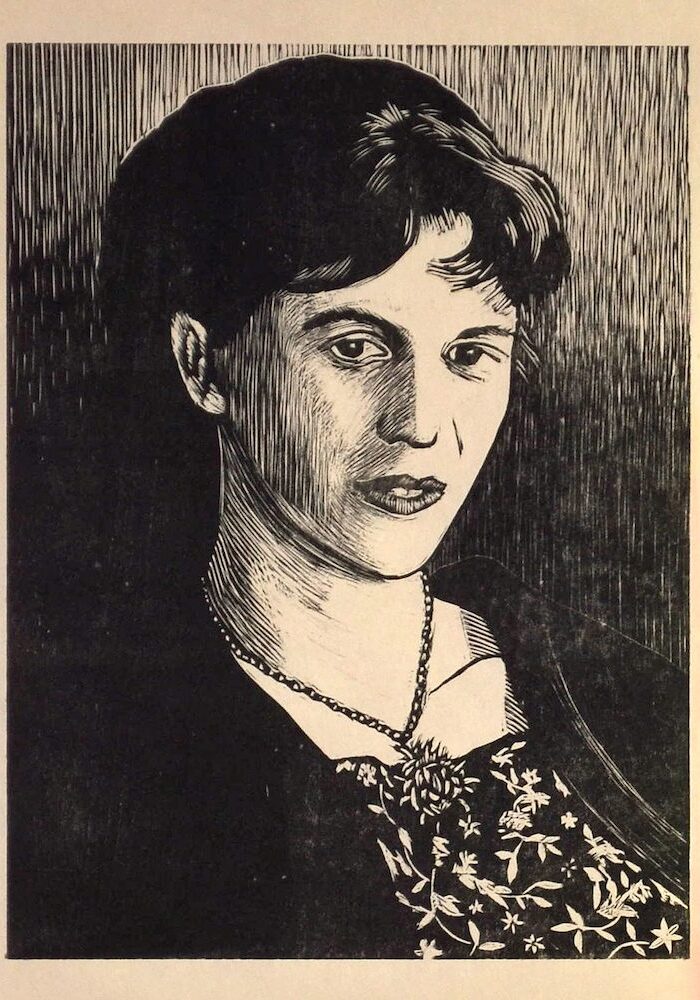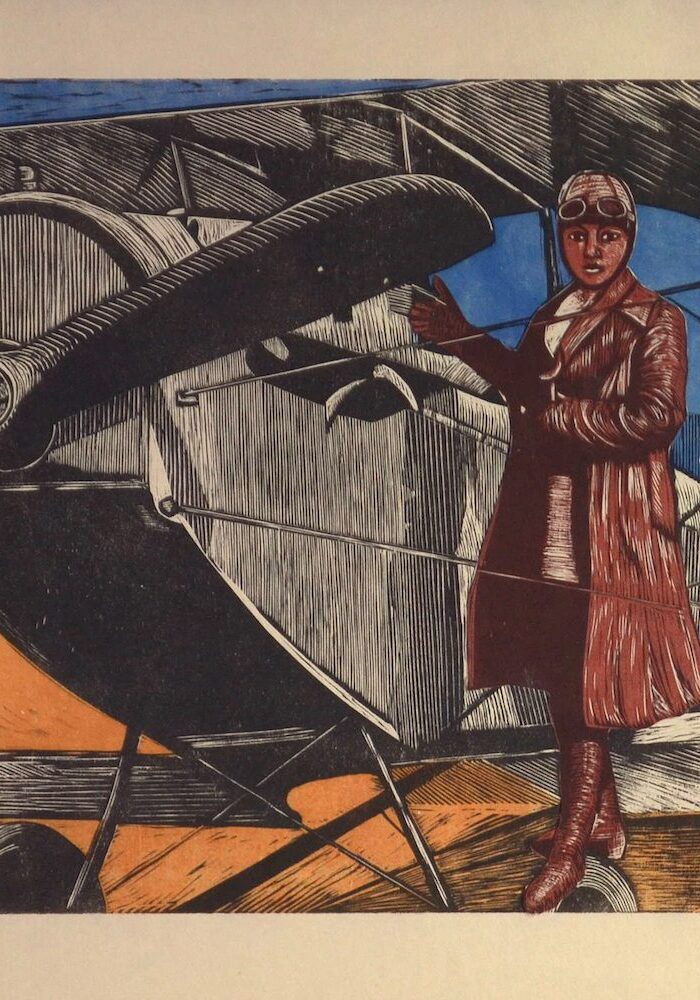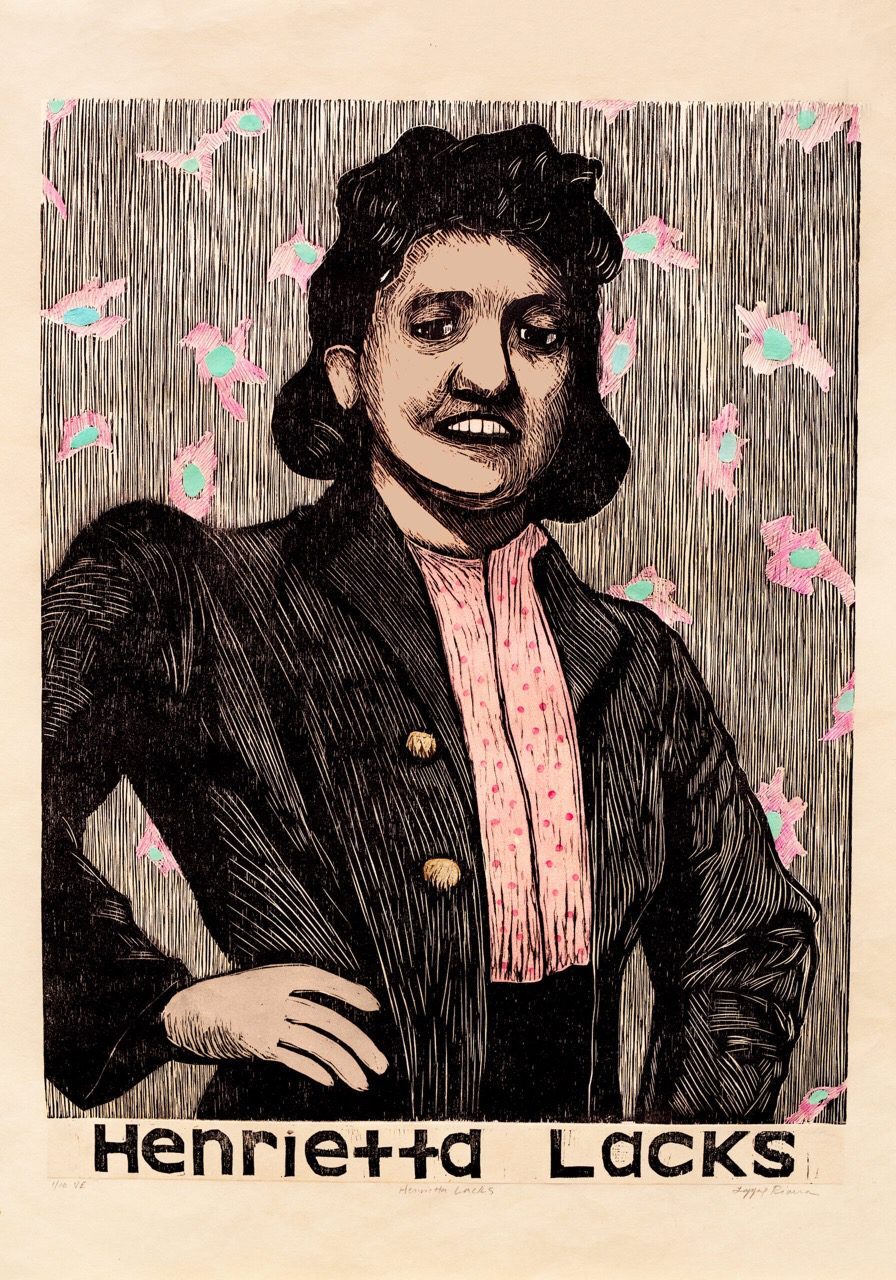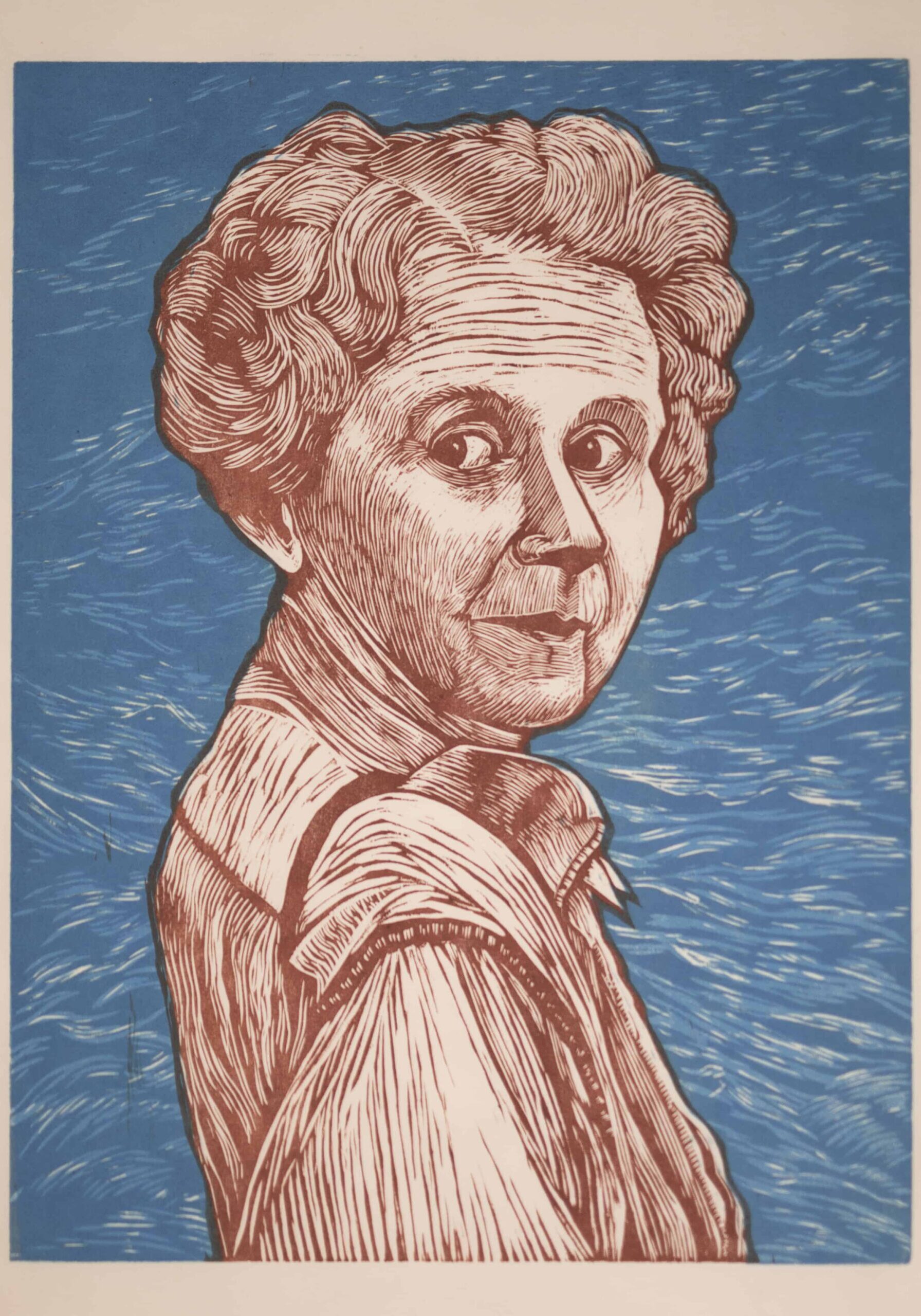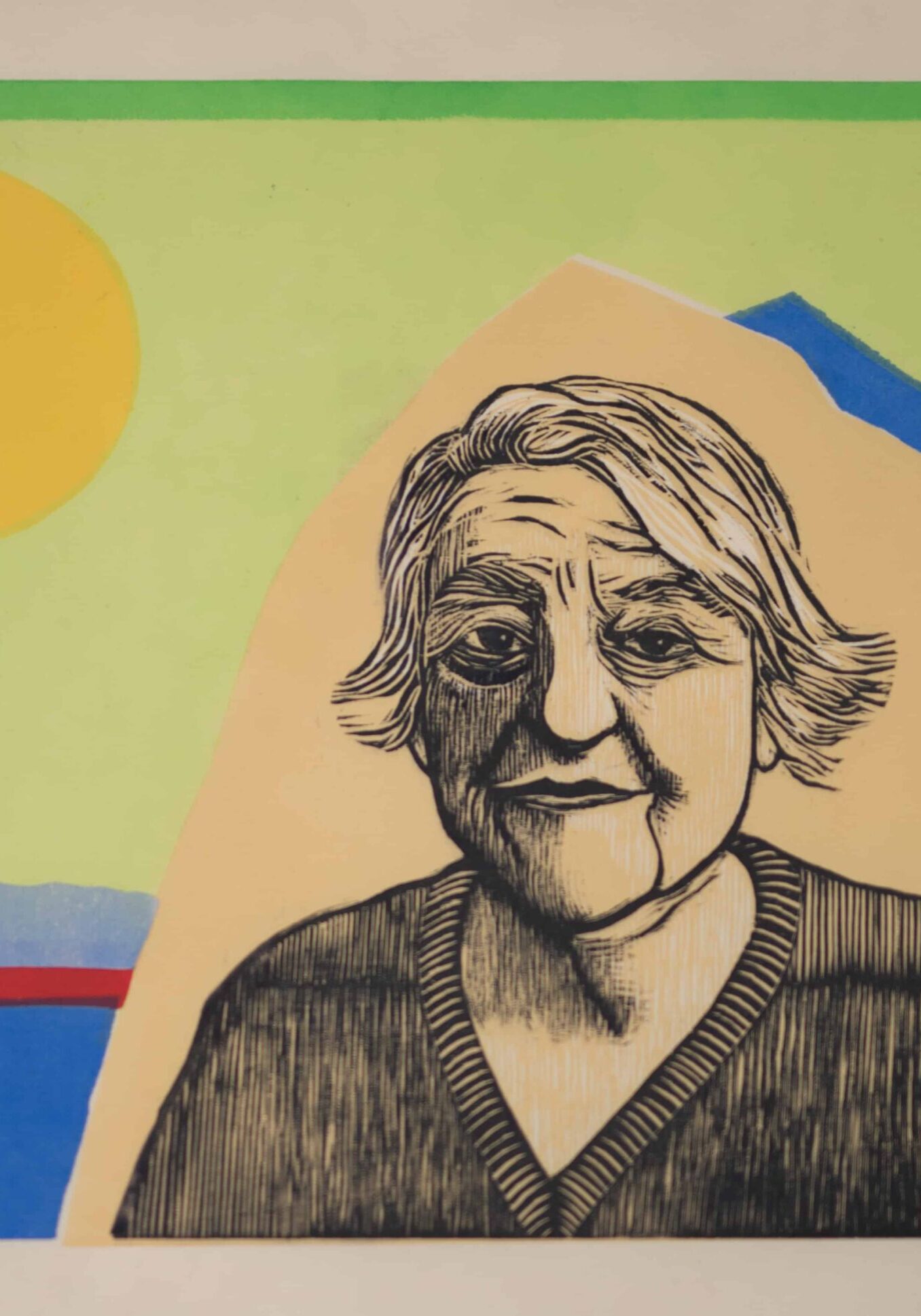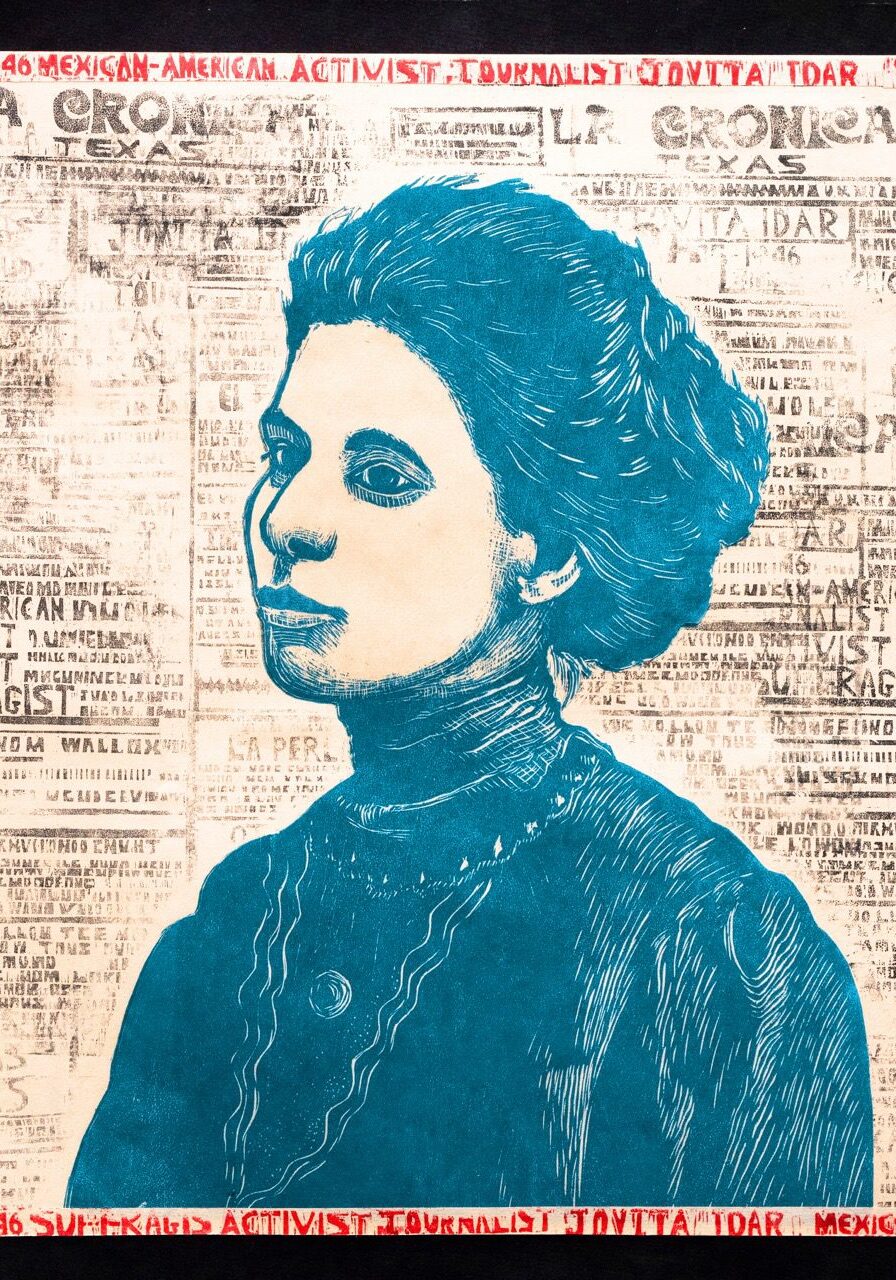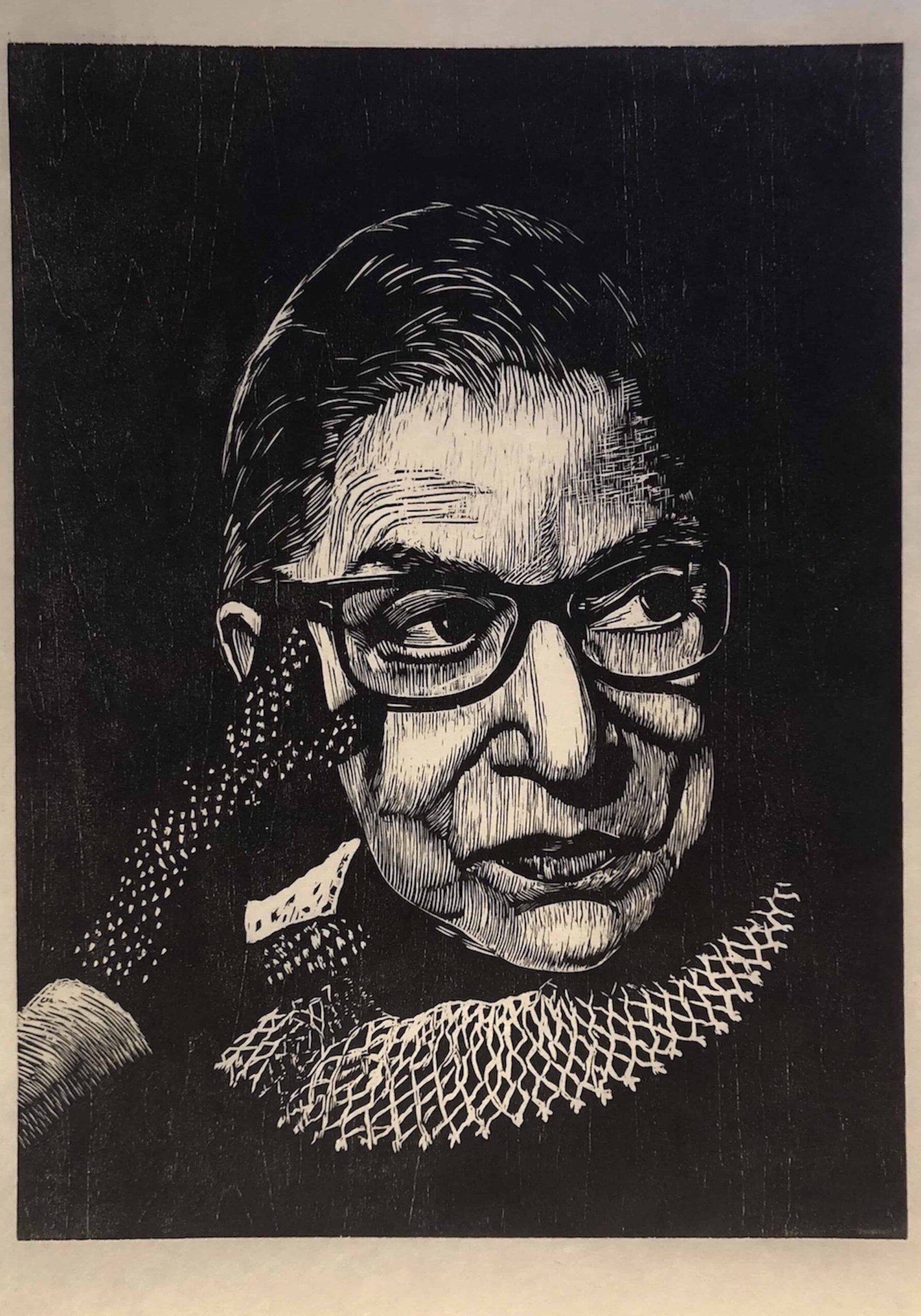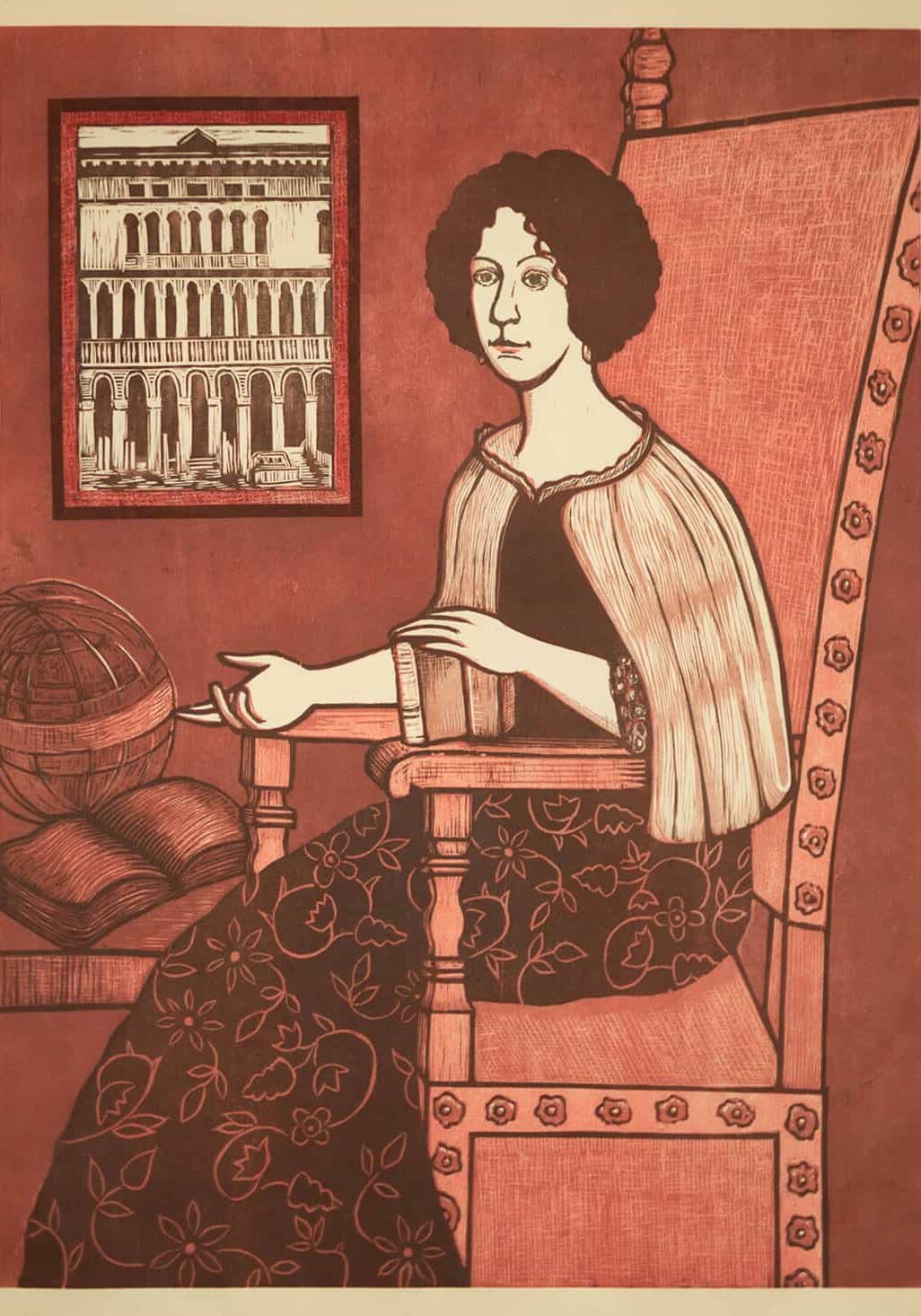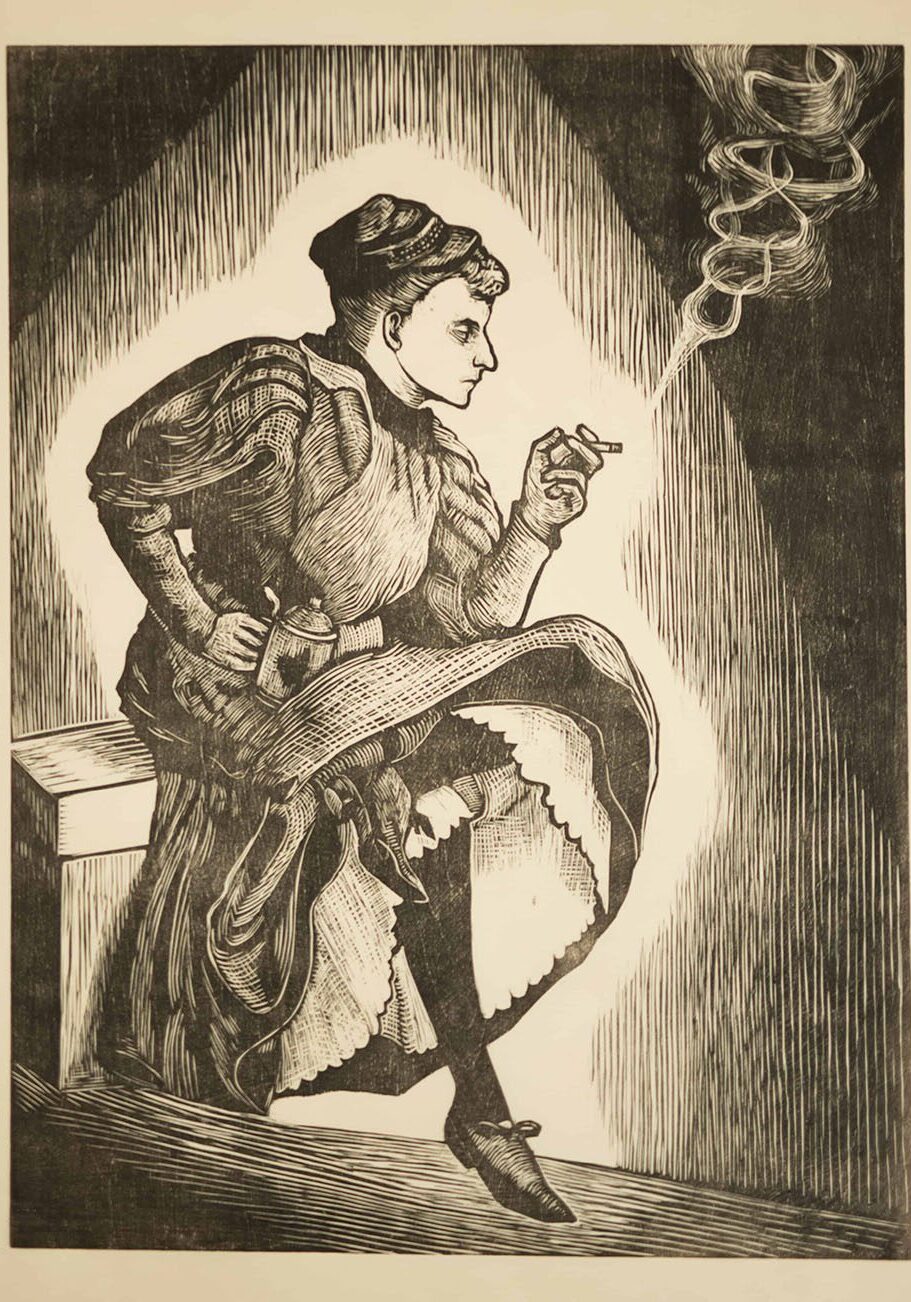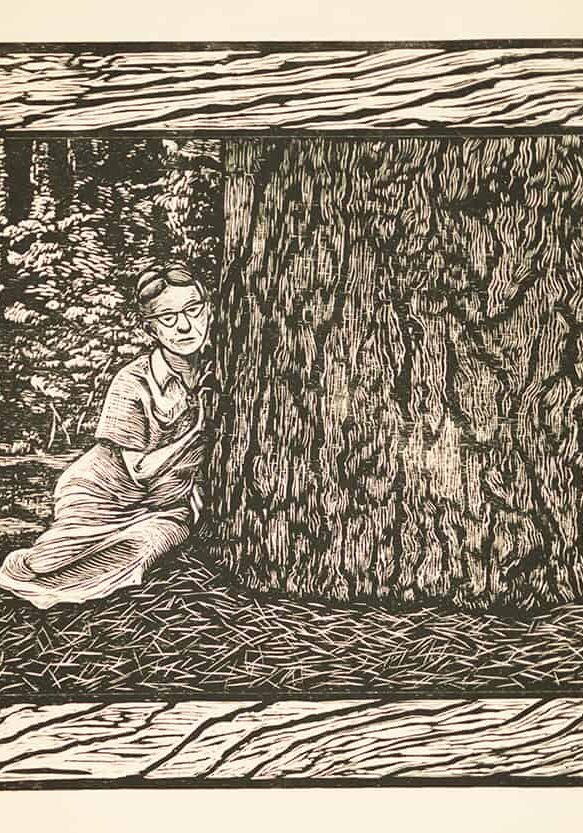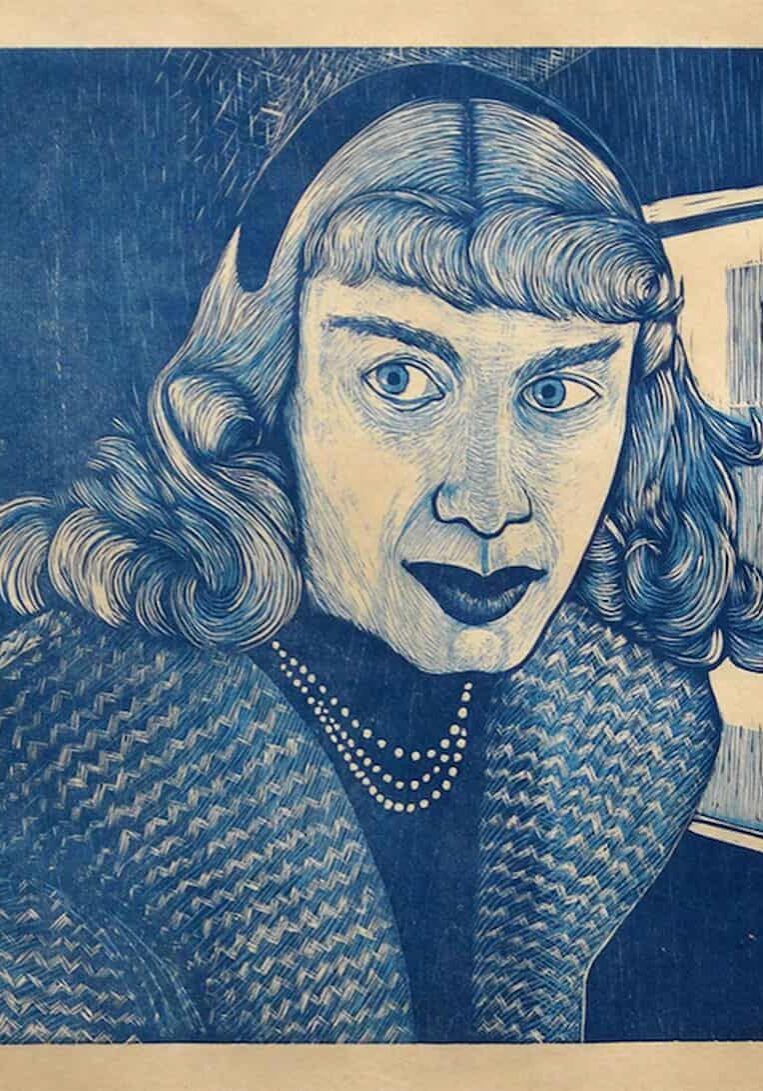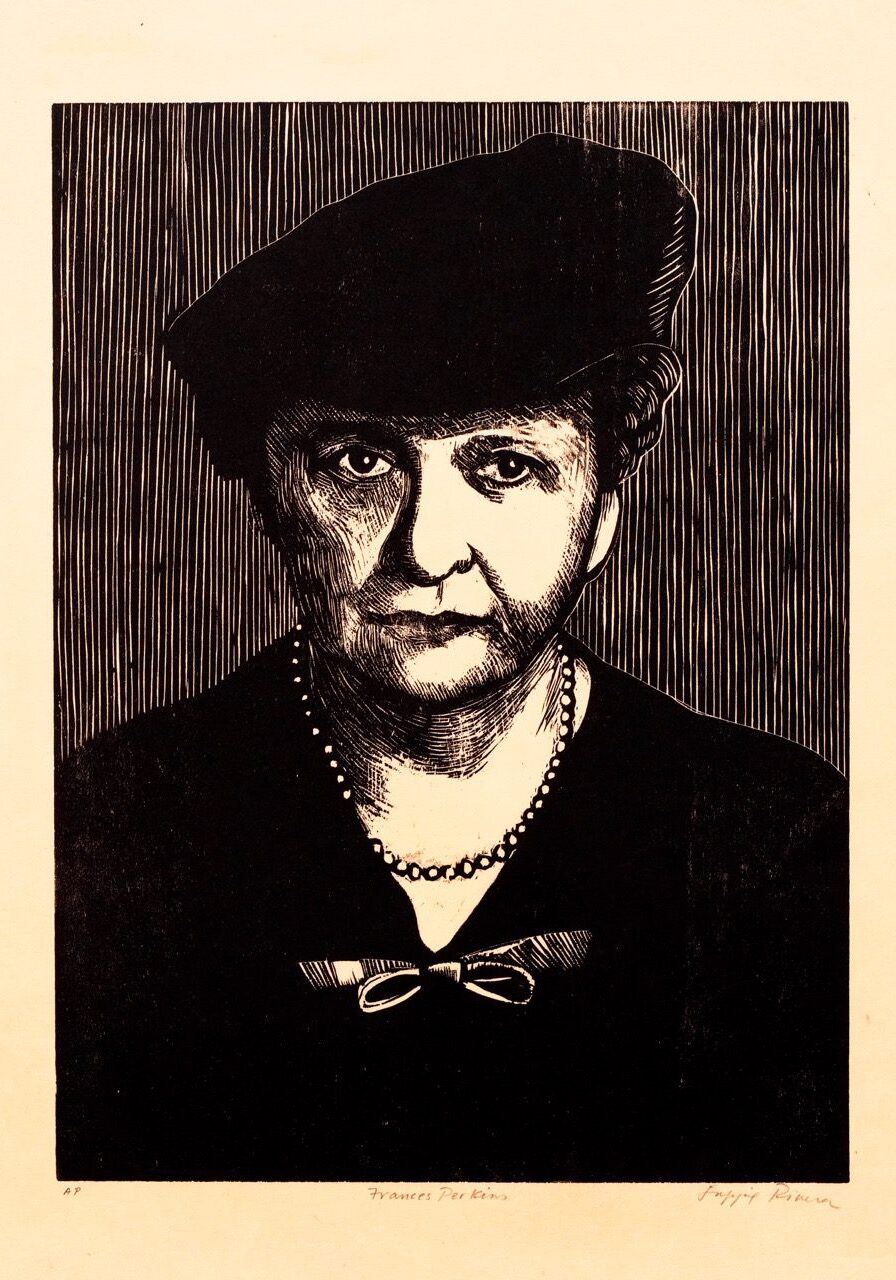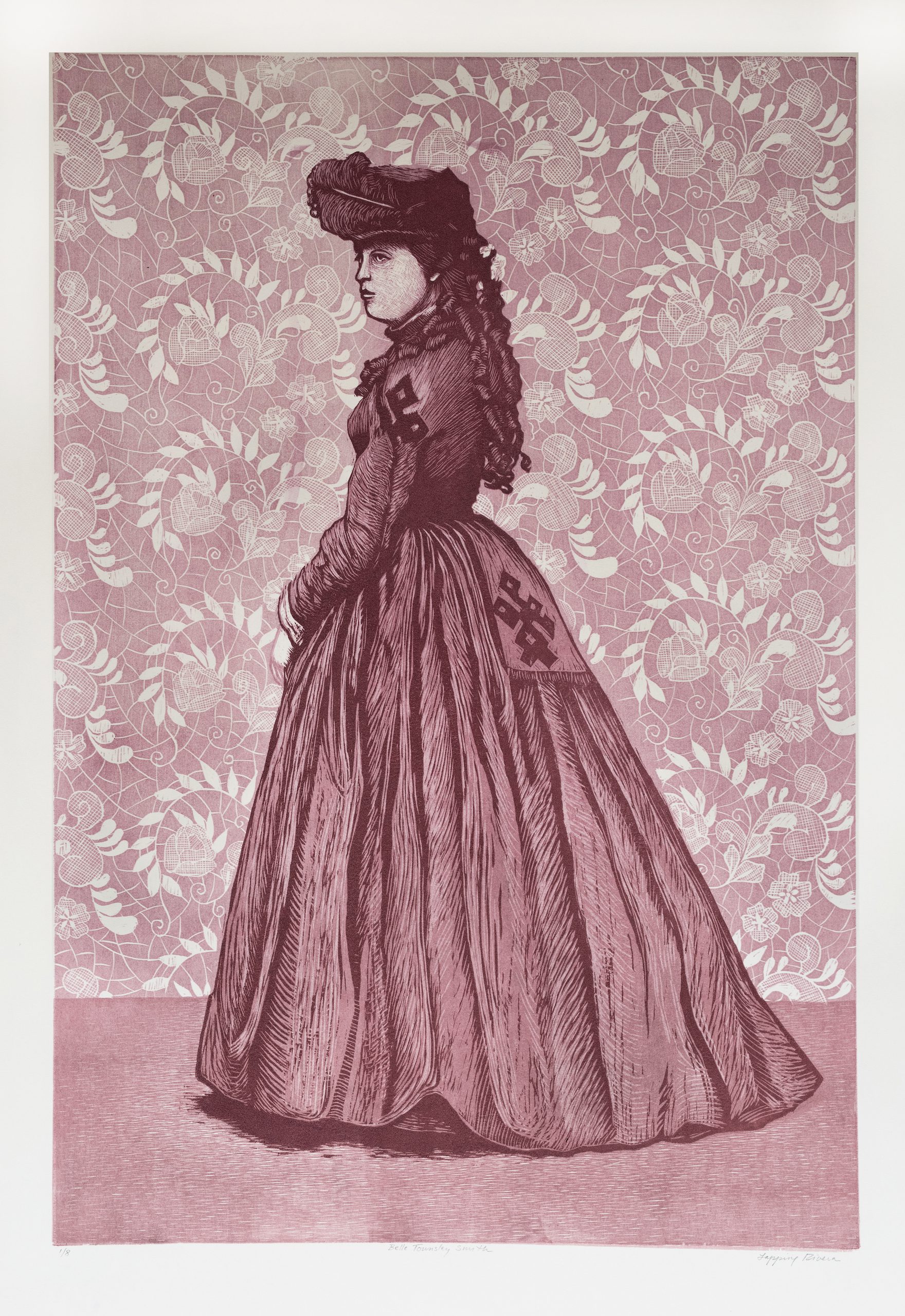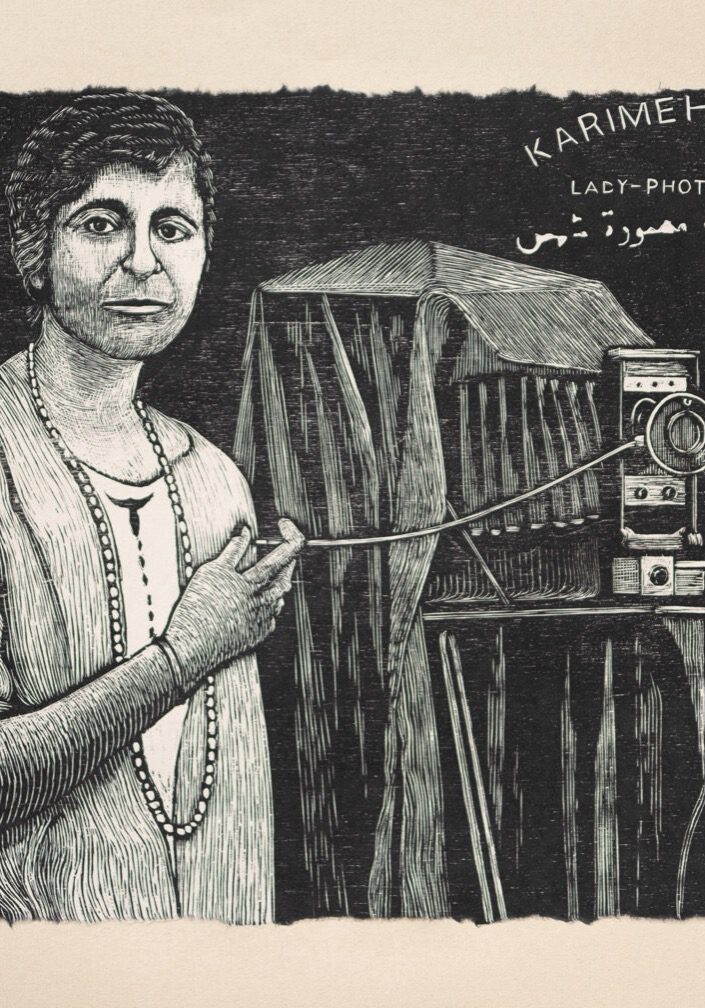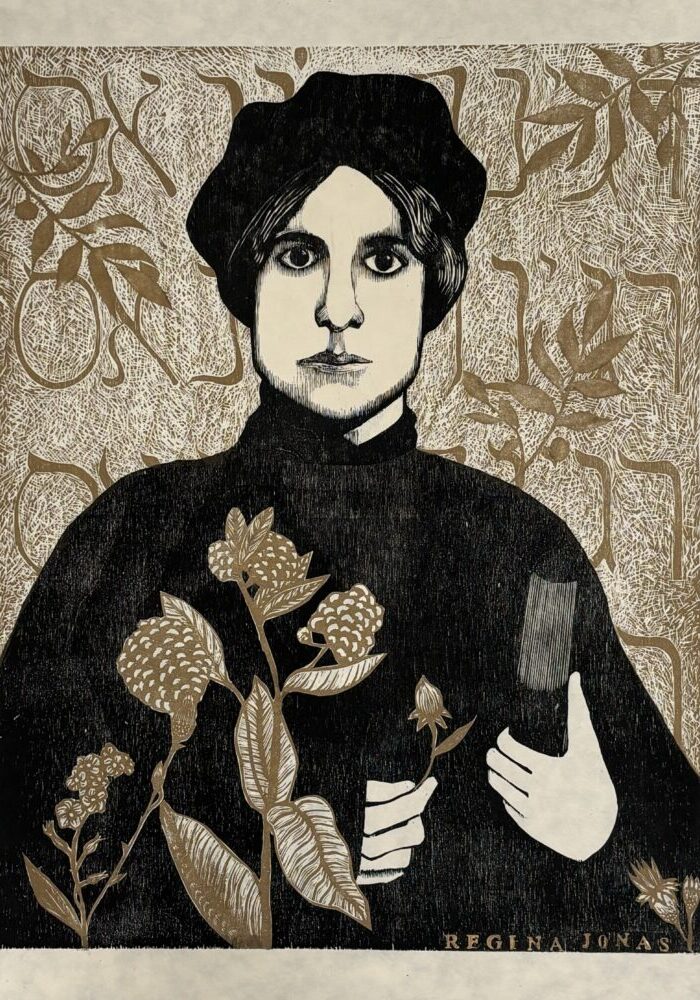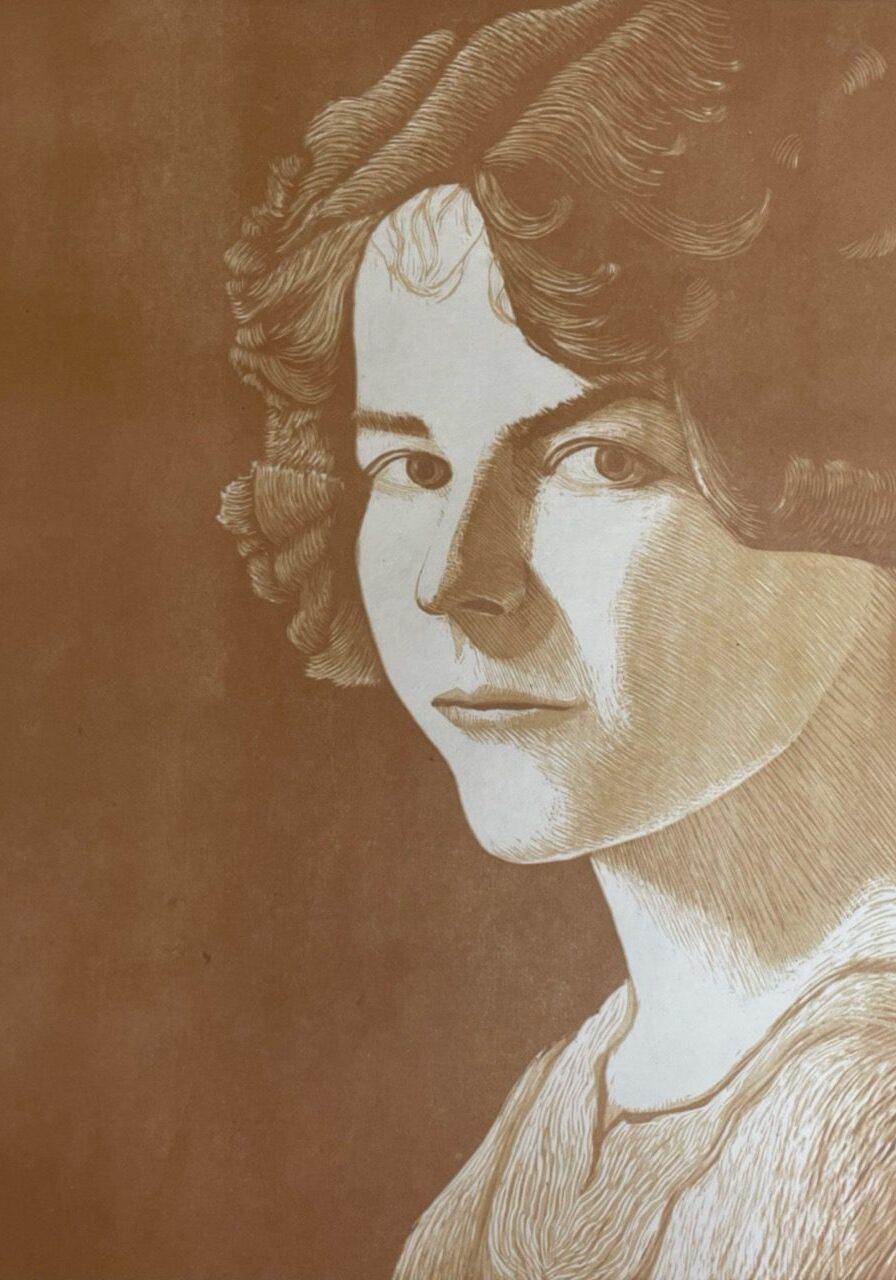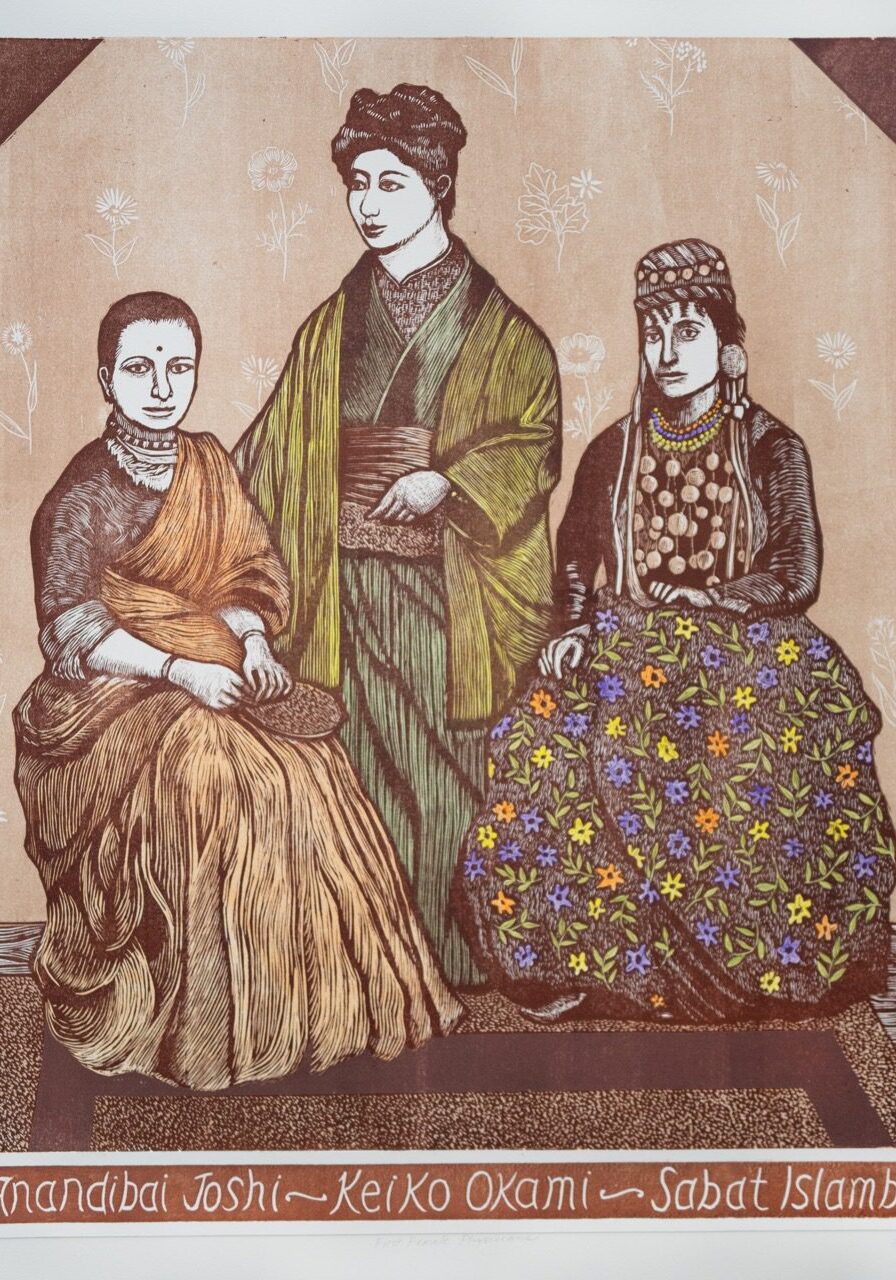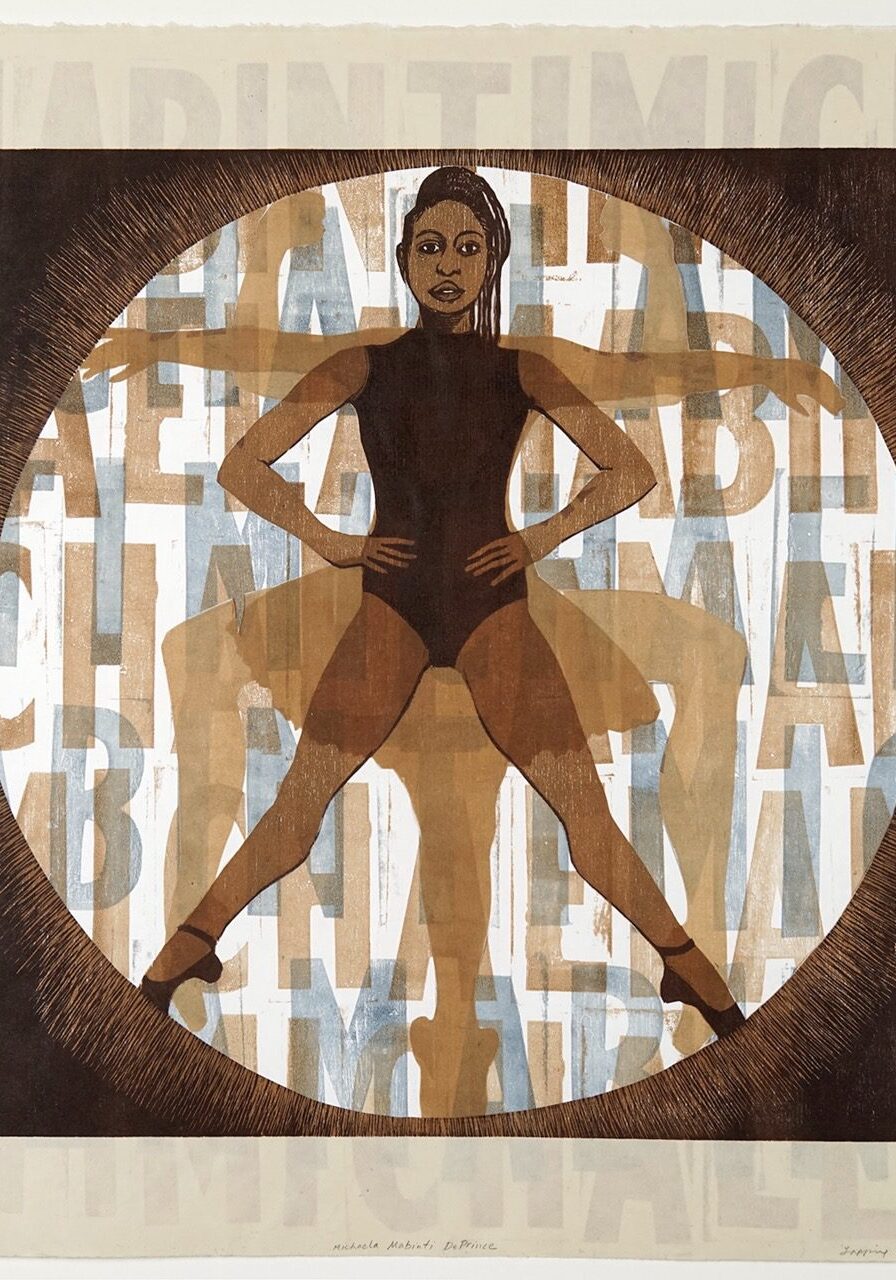Look Again: Portraits of Daring Women
Loveland Museum, Loveland, Colorado
December 7, 2025 - April 5, 2026
This ongoing portfolio of woodcut and collage portraits was originally inspired by the New York Times “Overlooked” series, which since March of 2018 has been sharing the stories of remarkable people who were overlooked by the NY Times obituaries in the past.
To further illuminate their lives and legacies, each of my portraits is accompanied by a portrait poem, written by a woman poet. The poets created their pieces in response to both the women’s stories and to the portraits.
Meteorology
for Nella
A pale sky swallows a dark cloud,
spits
and
I am
conceived never
white
bright
black
“down”
Dane
Indian
Caribbean
American
enough never
writer
woman
fighter
white enough
never.
Dixie’s contradiction:
sin without contrition,
yellow never gold,
silver never sterling,
the coveted lining?
never, only thinning shell
veined with fractures, cracks,
quake my bones,
fever the marrow,
never fitting, never splitting
always shorn, torn,
never passing
always contrasting
the criteria.
Behold me:
the eternally stifled, toiling
beneath a battered horizon,
the flanking gray,
neither cloud nor sky, though
brewing morass asunder,
thunder holding its breath,
lightning poised with
clenched teeth,
bruised the skin
of the wind,
the cacophonous quiet, kept
never calm,
storm perfect.
Tamara J. Madison
IDA
Too many nooses snug
against black necks⎯
men limp & motionless, dark
pillars against horizon. You
took up the pen, staunch,
relentless, sounded the alarm
of injustice. Small in stature,
your voice boomed⎯
phrases from the pages
you wrote ignited fear,
white men threatened
by a black woman’s rage.
How quick the wildfire.
Unflinching, you tucked
pistol in skirt pocket,
gritted teeth, somehow
fearless after mobs
strung up your brothers,
burned your press⎯
gold flames, melted metal.
You fought as only a woman
can fight, thread of tenderness
pulled taut through every violence.
You conjured wings, saying
I would gather my race in my arms
& fly away with them.
Rage Hezekiah
Our Women’s World
Melody S. Gee
Dual double my grandmother
and Qiu Jin died one
hundred years apart
Sun and moon have no light left, earth is dark,
born girls bound feet unbound
eventually two
arranged marriages two separate revolutions
the country collapses all
century
Our women’s world is sunk so deep, who can help us?
Jewelry sold to pay this trip across the seas,
My grandmother paid passage with gold too
out of the storm of a hundred
flowers Cut off from my family I leave my native land.
the revolutionary left her children for Japan
feminist heroes the government loves
a rebellion story after regaining hold
Unbinding my feet I clean out a thousand years of poison,
Qiu Jin studied in men’s clothes
My grandmother canned tomatoes
With heated heart arouse all women’s spirits.
on unbound feet the body
learns to stand on broken bones
Alas, this delicate kerchief here, Qiu Jin falls be
headed defiant my grandmother walks a new country
without the words she gives to me
Is half stained with blood, and half with tears.
https://thechinaproject.com/2020/07/15/a-revolutionary-against-empire-and-patriarchy-the-
execution-of-qiu-jin/
https://www.asymptotejournal.com/poetry/qiu-jin-five-poems/
Madhubala
already half gone
making up the heart's insufficiency
in bright, soft black
smile like color
as if the moonlight were real
black hair blushing
you ran here
on bare feet, a Bombay child
shoulders dancing
now pretend to rest
poise your chin in readiness
as if illumination
were your name
as if you were a spectral song
on gold water
as if this frame
and every flickering frame
made you full
Libby Maxey
Etel Adnan
You said “identity is your prison” and roamed the world borderless, art your harbor. You said “poets transcend language,” and languages flowed in you like a river. A polyglot exile who understood that all is translation, you let the wind enter your porous skin, shift the shimmering light into new constellations. A distillation. In motion you sank roots and sang “we’re rhythms,” extending your hands for the world to fall into your open palms. Algeria, Vietnam, Beirut; the gasps of Arab nations trying to free themselves from the clutches of tyrants broke your heart. You were of the pen and brush; with them you fashioned order, merciful, out of the unbearable. “The dream has no walls.” You called it love.
I, daughter of the nation-state carved out by cold-blooded giants from the empire that saw your beginnings, bow to the tapestry you wove out of the many threads of your life. The languages that inhabit me refuse to talk to each other, the threads “disappear in the wanderings.”
Therese Chehade
Inviting the Broad Horizons
—for Jovita Idár, 1885-1946
The border descended like a scythe
just forty years before your birth;
mountains, homes, and trees still hold
their Spanish names—montañas, casas, árboles.
But in dirt-floor schools, you witness
textbooks teaching children to feel like strangers
in their homeland. You feel it too
with the knowledge of intimidations,
lack of resources, lynching.
They mean to bury your voices in sand.
So you as Astraea, goddess of justice,
puncture the blindfolds with starlight
then illumine the broad horizons.
You as Ave Negra dip your wings
into wells of ink mixed with weeping and ash
then write your message in the sky
for los habitantes Mexicanos de Texas,
for la mujer moderna, for la raza.
You, Jovita Idár, write in La Crónica,
and later in El Progresso,
and then in your own press: Evolución.
From cacophony, you assemble
one sound at a time until
your steadfast voice is a ringing bell
whose strength emboldens strength, until
your endeavors live in the air, your words
traveling generations ahead to say,
When you educate a woman, you educate a family.
You welcome las mujeres and las niñas
into la Liga Femenil Mexicanista.
And when la Revolución draws near,
you pass through the border
to heal the wounded fighting for their democracy.
Your heart erupts for them. You promise
to always stand in the doorway.
We feel your presence even now, your voice.
When officers came with sledgehammers
to destroy the press, you refused to move.
You said, No. I’m standing here.
The Longleaf Pine Woman
—Caroline Dormon (1888-1971)
I have listened to the trees talk, later
than I longed. My ear was its own
stethoscope, I felt the pulse, I heard
the waters flow through xylem
in vertical rivers, emptying
into fireworks of deep-green
needles. Need grows deeper.
For so long, I’ve collected life
histories. I’ve walked the land
through Louisiana, parish to parish,
raised seedlings, felt the fire
of their roman candles. A longing
carried me as I toiled to save them.
It can take a long century to reach
the forest canopy where sprays
of needles watch the clouds
and stars. And no bed is finer
than a needled floor, no resting
place more welcoming, far
below the oval, open crowns.
Being resinous, pitch and gum
can save them from fire, and
skeletons of snag may recover.
But from the blade? For this I walked.
—Sharon Tracey
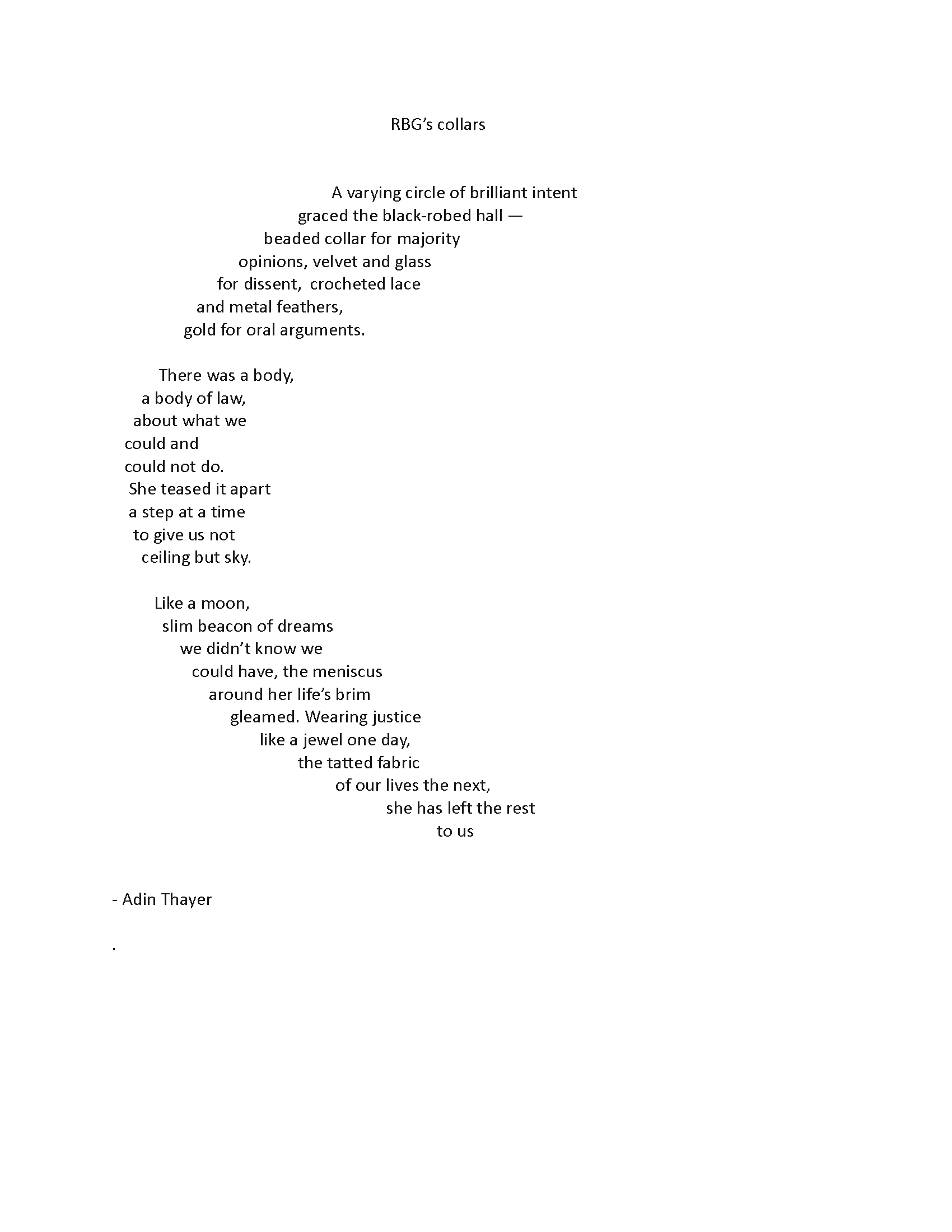
The Seven-Language Oracle Confesses
by Jennifer Martelli
for Elena Cornaro Piscopia, (1646-1684), Doctor of Philosophy
All day, on the verge of my seventh language,
I break things: the gun metal globe, the spine
of Sappho’s translated fragments, which will not
exist for two hundred more years. She wrote:
In some future time, someone will think of you.
The stiff linen pages slice my fingertips. I leave
peonies of blood on all I touch. Yet, I’m glad
for this tongue. Oraculum Septilingue, they’ll call me.
Last night, I dreamt the collective dream of Venetians:
gold snakes and blood-red wombs etched into stone
columns of the university. The sultry air steaming off
the canal slithered into my maroon dreamscape. Someday,
I’ll be a crater on Venus. Oblate, devotee, on the verge
of love, you won’t even need a convex lens to see me.
A Woman’s Eye
by Sharon Tracey
—for Frances Benjamin Johnston (1864—1952)
Born during the Civil War, here you are
seated in profile, just like your own
self-portrait you called The New Woman—
cigarette smoking, beer stein in hand,
petticoat showing, legs crossed man-style,
illuminated, full of dreaming and drive
the images to come far reaching—
portraits of five presidents, diplomats,
miners, black students at the new
universities in Hampton and Tuskegee,
elaborate gardens, coal fields, and caves.
Your camera then turned to the bricks
and old buildings across the South,
many soon to be lost. A life’s work
of lucid photographs, detailed in shafts
of light, cracks of dark—accumulating
like leaves falling from trees, each
a fleeting history, each wielding more
than its own weight—twenty-thousand
prints and thousands of glass and film
negatives archived at the Library of Congress—
time compressed, composed in a woman’s eye.
—Sharon Tracey 10/15/22
Rose Zar, Hiding in Plain Sight
Look again.
Can you see who I am?
Do I give you even a moment's pause,
one more survivor of the Holocaust?
Rose ~ the name I took when I came
to this immigrant gathering place,
my husband and I, lone survivors,
haunted by our terrifying past.
Ruszka ~ my childhood name
echoing through our Polish home:
love...learning...laughter...
that world is gone forever.
Rushkala ~ my father called me,
he who prepared me, branded me
with the duty and courage to survive,
exiled from our ghetto grave.
Wanda ~ Arayan Catholic forged papers,
I was hunted, always afraid,
held in the mouth of the wolf;
how hard it was never showing fear!
Shoshana ~ Hebrew Zionist rose
happily singing of a promised land;
only three of our Youth Group lived.
Forty-two died. Israel was never home.
Hiding in plain sight, remembering
always, inside: I am a Jew,
even as they shrieked: “Alle Juden Raus!”
Prey of hate, fear helped me focus.
Look again.
Do you see who I am?
Joy is a stranger to me.
My life is my grief.
Nancy Collins-Warner
Tiger Lady
for Mabel Stark, born Mary Ann Haynie, 1888-1968
Just past twenty when she first walked by that royal Bengal—King—
and before long she had the whole streak suspended, walking thin lines
at her command, jumping through blazing hoops, assembling a wild pyramid
of striped power, held in place by the promise of raw meat and her stick.
Maybe she thought of her dead father and mother, and the stepfather
she escaped. She wanted to quit hoochie-coochie dancing—her bared belly,
twisting her body round a pole—and nursing, that other women’s work,
without thrill, the sap of taking care, spotlight on the sick and not the vital
growl. It makes sense she’d want to cast off fear, wield the whip,
hold back what would maul her if given half a chance.
She said I love these cats as a mother loves her children. Her tigers
raised under a tent, behind iron, made to pounce on pedestals and pose.
That is one kind of caring, all whip-smart and firm, demanding
arrangement, with the coo and the strike. What other fierce things
was she snapping into shape, inside her mind, prowling the edges of her
caged heart? As a woman, she would have known that balancing act,
what it is to be disciplined for baring the teeth we are born with.
Nearly eighty, at the close of her career of cats, she felt blank
as the bullets in her warning gun without them, downed
sedatives once she was no longer allowed to wrestle with tigers.
She leapt with them, through a kind of fire, when she entered their cages,
when she stepped to the middle of the ring. What conflagration
was she stoking with her little cape, her metal gloves? The crowd roared
over a circus backdrop reeking of peanuts, sweat, and rancid hay,
while teeth tore away a breast, ligaments, bestowed her with 700 stitches,
blood pouring into the chalices of her 26-inch boots. The only way she felt
alive, each tooth undoing old wounds fast as a flick of flame. She admitted
there was no such thing as tame. She placed her face between the open jaws.
Rebecca Hart Olander
Annie on the Edge
In your dark dress, you stand
beside the dark capsule of your design,
weighted to give gravity a hand
when you fall over Niagara Falls.
Pledge of bravery in
your posture. You lie about your age.
When you climb inside the barrel,
your skirt forms a padded circle.
The harness. Then the lid. The wide
river takes over.
At the brink there is a pause
and you pause.
In twenty minutes, the journey
ends. You are the first ever, the first
woman to survive the fall. The key
to your livelihood. Your survival.
The adventure so unlikely,
its desperation.
For a brief time, acclaim. Money. Brief.
You circle back to the watery
riot of the falls. At the end of your life,
pamphlets and potions and magic tricks
for tourists like us.
Jean Blakeman
Wings
“We’ll take the girls afield, and let them get acquainted with the
birds.
Then of inborn necessity, they will wear feathers never more.”
Florence Merriam Bailey
Birds Through an Opera Glass is what she called the book
she wrote at 26, upending the practice of shooting
birds to study them. Then there were the ladies of marvelous
plumed adornment, buying birds to death: 5 million/year
multiplied by the songs no one ever heard.
Not all of us are equipped with a driving passion, not all
driving passions are powered by love. Florence
said to the women, bring your opera glasses for our walk,
knowing once you watch a chickadee watch you,
you’re different. Maybe tuberculosis taught her something
we can’t learn an easy way, about constriction, and how anyway
to let the heart fly into the world. Think of it: 5 million x the years
since she wrote her book equals how many seeds carried
to new fields? How much pollination of the flowers of those seeds,
and honey made in the trees her saved birds planted?
Adin Thayer
Hinged Dreams
“I now have one desire — to make films.”
Lotte Reiniger
A sorcerer thin as a rake with gnarled knuckles shakes them
at Prince Achmed as his horse gallops
across a shivering moon. A princess bird descends by an opal
lake and steps from her owl-soft plumage. Lotte’s life
is a story of stories told through thinly hammered lead.
Before leaving the land of the Fuhrer, her gifted fingers
woke, and a gift’s desire was the fuel for their burning speed.
These stories flew from the small scissors
in her hand and step by step she coaxed them
across an under-lit screen, still-shot by still-shot. By each
the world’s treasury of magic grew and the mind
of childhood was nourished. As is the life of any pioneer, hers
was a series of obstacles, money, loss, the post-war taste
for realism, and steadily she scissored through them,
and who would not, who found within herself so rare a gift,
to imagine metal into motion, to snip a crow into dipping across
the moon of her imagination or a princess into slumping
down for a century of sleep?
Adin Thayer
Silueta
—for Ana Mendieta
The corpus—female body as icon—
its own landscape
was always your life’s work.
Silueta you called them—
dressed in weeds and white flowers, blots of blood
mixed with dirt. Apparitions thatched
and as matted as shocks
of wild hair. One
you laid to rest in an open stone
tomb, legs slender as pipettes
and translucent as veins. One
you carved in a dry streambed. One
you torched with red fire.
Some you made with your own
skin as canvas: a coat of mud, the grit of sand,
the end product of many things.
Raw and exposed, you are brave.
There are multitudes.
An exile seeks roots.
With a camera you tried to save them—
echoes and traces, afterimages
and impermanent marks. Penumbrae
caught between light and dark
in silver gelatin
the body—a landscape of the visible—
but also a figuration
of what lies
in shrouds of earth.
Sharon Tracey
Woodcut of Sylvia
There are others in the series of photographs
the artist could have chosen. The one where her smile
is a cracked-open geode. Radiant. Or the one beside him
on the couch, her crown of thorns necklace partially
visible there too, Hughes looking like a tired old man.
Here, her armored jewelry is prominent, showing
she won’t shy from hard edges. She’s interior, but she’s not
looking at nothing. She’s just not looking at you, or me.
She’s training her mind’s eye to make miracles.
She is witch-magician, yet only thirty when she dies.
Still 1959 here, neither child born yet. Curl of girlish
bangs, crosshatch cheeks, cardigan, and briar patch dress
on which the nettle-like necklace makes it seem
she’s fastened a tidy explosion just below her clavicle.
Dangerous adornment, she’s a woman avoiding a gaze.
What can’t be seen is sea, rain, the slick rocks
of the North Shore, the insistence of blue skies and bulbs,
the exhaustion of spring, the incessancy of clouds.
Her brilliance is rooted there, in the formative spaces,
before nappies and milk mind. But not before poetry.
That was manifest in the salt-cured hometown,
the fierce mind admiring other gods, the heights to which
they understood expanse and wrote that way to match,
though she outmatched them all. Hairshirt necklace,
hairball amulet. Destined for domestic and divine.
Rebecca Hart Olander
Queen Bess
Built for flight, for soaring, she who
always checked her wings, the weather—
aviatrix, wing-walker, barnstormer,
first black woman pilot in the U.S.—
heard the stories of WWI flyers at the White Sox
Barber Shop in Chicago as she worked doing nails.
The military selling surplus “Jennys” in the twenties
(she would own two). And yet, to earn her pilot’s license,
the sharecropper’s daughter raised in Waxahachie, Texas
had to leave the country, train in France. The biplane
mostly wings, no steering wheel, no brakes.
If you fly above the earth does the world look truer?
She flew figure eights, dipping and looping, stuntwoman
and guide of her sky-self, parting the blue—
the see-through clouds, fully licensed to operate.
Demanded blacks and whites enter the same front gates.
She was thirty-four the last morning.
You don’t need to look up the weather report,
it was said to be a wrench—jammed—that sent her Jenny
spiraling, nose-diving, past the future roundabouts
to be named after her, the flying clubs she dreamed of
the pilots flying low, dropping blossoms on her grave.
—Sharon Tracey
The Longleaf Pine Woman
— Caroline Dormon (1888-1971)
I have listened to the trees talk, later
than I longed. My ear was its own
stethoscope, I felt the pulse, I heard
the waters flow through xylem
in vertical rivers, emptying
into fireworks of deep-green
needles. Need grows deeper.
For so long, I’ve collected life
histories. I’ve walked the land
through Louisiana, parish to parish,
raised seedlings, felt the fire
of their roman candles. A longing
carried me as I toiled to save them.
It can take a long century to reach
the forest canopy where sprays
of needles watch the clouds
and stars. And no bed is finer
than a needled floor, no resting
place more welcoming, far
below the oval, open crowns.
Being resinous, pitch and gum
can save them from fire, and
skeletons of snag may recover.
But from the blade? For this I walked.
—Sharon Tracey
Thank You for Your Labors, Pioneer, Undertaken Often at Night
It is soothing, scientist, to think of the sand fleas,
and the ghost crabs that devour them, and the sea bass
that eat them, then the shark school circling,
and the remains of the fish tossed back in the jetsam
to the beach where the fleas flock to their food.
We can be comforted, deft lyricist, by your description
of moon-bewildered squid, how the swath of light
from the fullness finds them dashed upon the shore
in their panicked retreat, where the following morning
they serve as feast for scavenging gulls.
When we remember, beloved daughter, our own gone,
or you, by cancer, at 56, your mother might come to mind—
she typed your first manuscript to arrive famously without error
to its publisher—and we will know some things
can be managed by love and attention, and some can’t.
With your ode to ecology, Under the Sea-Wind, you urge us
to abandon human yardsticks, while the book itself survived
time’s ravages. You salvaged the original moldering illustrations,
forgotten in a warehouse in the midst of world war, to reprint
your masterpiece of sea, wind, migration, and change.
Rachel, you might be glancing backward at us
in our beautiful hell, driven not by fear, like Orpheus,
but by knowing we have not followed you into the sky or sea.
You could be draped in plumage splashed with cinnamon
and rust, like older sanderlings on their return flight.
You dwell in the shifting places, the microscopic,
the abyss. You knew it was our own folly, not any god,
that would trap us in the dark. Your eye, sharp
as a sandpiper rooting out a fiddler, took note. So many
tiny black journals. So many hours in the field.
You are in the tide pools. You are urchin, anemone,
sea star, mollusk, limpet, barnacle. You are algae, mussel,
and sponge, soaking in the beauty and wonder
and sharing it with us. The waters rise, and you cling
to the granite, to our conscience, our regret.
And despite altered terrain, the silenced season, it lulls us
to read what you left in your wake, protector of prairie
and ocean edge. How small a part we are in what there is.
How we should discriminate when we blanket earth and sea
with ourselves. To think it could still be as you say, the chain.
—Rebecca Hart Olander
HeLa: Stolen Gifts*
Henrietta (Hennie) Lacks
b. 8/1/1920 – d. 10/4/1951
She did not want immortality,
just life. Johns Hopkins, decades ago
cells pilfered, slashed from her cervix,
dropped onto clots of chicken-blood.
As they doubled each day; named HeLa.
Hennie, heartbeat of her clan –
bein' with her was like bein' with fun.”
Last goodbyes – her five children on
a small patch of grass as she sobbed --
pressed face, hands, to hospital glass.
Motherless days, months, years.
Daughter – longing – nails painted
fire-engine red like her mother's;
lifetime quest for answers. Son,
in fury, “Them cells were stolen.”
No permission given – “50 million
metric tons” grown and used in labs
worldwide. Family uncompensated.
We all have benefited: Gene mapping,
new chemos, vaccines – polio and COVID.
How do we thank you dear Hennie?
By Delores Juanita Brown and Janine Roberts
*With much appreciation to Henrietta's family for telling her story and theirs to Rebecca Skloot. All quotes and details are from the superb book by Skloot, “The Immortal Life of Henrietta Lacks”.
I get you, Betty.
Convinced of our magnificence even in the silence.
When they played, “not you,”
we
sang “watch me.”
Even with yolk in our lashes.
Pieces of work ever lacking.
We wear the woven as a door but ache to trade
for a suit of skin.
Born in prison, we wouldn’t be caged.
Won’t be caught.
We’re determined
dynamic stubborn queer
biting brilliant
precocious
strange
unstable
uncertain
Lost
we yearn for personal truth connection clarity love peace exhilaration power strength speed
We tasted the crumbs
wanted the bite.
The nostalgia of
white knuckles on a wheel,
leaning into a curve,
controlling the machine.
Dominion over a landscape.
But we’re so shy scared tired safer
Alone.
—joj
Belle Townsley Smith
(1845–1928)
Born and buried in Springfield
and co-founder of the city’s first art museum
named for her husband alone:
George Walter Vincent Smith Art Museum
See for yourself. It gleams above
the main doors.
Married in 1882, they set off for Europe
where two years of collecting turned into five—
tapestries, paintings, bronzes, ceramics,
illuminated manuscripts. Returning, they
offered the collection as a gift to the city
if they would build it a home.
Her passion was the art of lacemaking
and she sought out the finest—Italian cutwork,
Rose-point, Spanish, and French laces—
designed and handmade with needle
and bobbin, threads of linen and silk.
The lacemaker threading the eyelets,
the openwork web delicate and growing,
covering yet revealing. Creating veils,
shawls, and lappets—the lace strips
worn by bishops and popes or attached
to a woman’s hair in pairs. She organized
the museum’s lace exhibit in 1912 to fanfare.
Today, walking across the Quadrangle
and approaching the Pompeian brick façade,
it’s hard not to wonder if anyone suggested
one of his names be given up so one of
hers could shine. A legacy handed down.
After all, the museum was her child.
—Sharon Tracey
Legacy
by Dorsía Smith Silva
nestled within your mind
light unbranched
and shook out many
breaths to center women
across society’s core
women that came to you, dear doctor,
with their brown and Black voices shut
and choices battered
women that had sorrow
draped across their shoulders
until you extended the push
for women to have choices of their bodies
for women to say never again
to forced sterilizations as you
shaped guidelines to encrust rights
dear doctor, you spun hope
for those with HIV and AIDS
to unhide and cup compassion
like fresh pulses that stretched
throughout this world
from New York to Puerto Rico
and Puerto Rico to New York
your unbuttoned call for the island
to be free was built on the song
of the coqui and wish of the UPR
you carried Puerto Rico, dear boricua,
like hope within your chest
it rose every time you came
to where the community huddled
and injustices vanished
so much change became fulfilled by your fingers
and bloomed in various directions
you as the first Latina president
of the American Public Health Association
you with the Presidential Citizens Medal
so many galaxies that transformed from your touch,
dear boricua, so many equalities that lit up
because of your fearlessness, dear doctor,
so that even though cancer overtook your body
it has been impossible not to reflect your light
Why Regina Jonas Became a Rabbi
by Pamela Wax
Because God knew her name,
and she heard it called.
Because the lapis lazuli ceiling
was waiting for her,
God’s feet upon it.
Because Yalta had broken 400 jugs of wine.
Because Bruria learned 300 traditions
from 300 masters in a single day.
Because Yalta and Bruria were her mothers.
Because she was Sisyphean, rolling
her boulder up the mountain
again and again to gain purchase.
Because she was an ox,
stiff-necked, mastering the tools
of pilpul to gain entrance
to the master’s house.
Because she didn’t aim to dismantle it.
Because Europe was burning, her people
were wanting.
Because she could feed them almost 4000
years’ of falling down and getting up.
Because she didn’t fear death.
Because she loved
with all her heart, her soul, her might.
Because we—hundreds of us—
followed her footsteps, shards
of lapis lazuli in our soles.
For Karimeh Abbud
by Priscilla Wathington
Yours was a world all in its place
your baby brother tucked into his mother's bed like Galilee
was tucked into her Palestine with that faraway look
in the eyes asking all those questions of the mustache
and the dove-necklaced dusk,
the organ-cooing night.
There you are in that unshaken globe
rising so light can find your arms
moving furiously toward the secret chamber
of your camera. At seventeen, you looked where I looked
and saw Bethlehem painted slick with pink
and soapy whites. No reenactors were hired
that morning. The birds woke and found a sesame candy bar
teeming with larvae. A shopkeeper's sleeves danced with pine
-pricked light as he wiped the dust off a cup.
Nothing held still but your finger choosing
where to freeze the hour: 1919 Palestine
a silver life. Yes, we were acrobats
standing on a bottle-propped chair,
shy young mothers of peach
-cheeked babes with fine thread
along our hips, yes,
we were peasants memorizing
the beetles of the fields, old men breathless
among Sebastia's columns, we were crowned
Miss Palestine of Akka with pearls down to our waist,
and we were bare-footed teens
pulling water from a Nazareth
well, with a half-smile and a palm to shade our eyes,
yes, we were that perfumed city
kid, briefly immaculate, for you,
our lady, our national photographer.
But time rushed in and when you took another picture,
your baby brother had fallen from the bell tower
and there were soldiers grabbing a shopkeeper by his sleeves.
And when you looked again, Zionists were photographing
the plains, plucking postcards
from apartments. Oh photographer of the sun
after your death, we knocked on the water tank
and suffocated among smugglers.
Still, your camera returns us
tall and tan to our towns and our farms.
Oh we are the land’s
lavish fruits.
***
Poem Note: The lines “after your death, we knocked on the water tank /
and suffocated among smugglers” are in conversation with Ghassan Kanafani’s Men in the Sun.
***
Karimeh Abbud Bio:
Born in 1893 to an educated Protestant family in Bethlehem, Karimeh Abbud's life spanned a critical juncture of Palestinian history, from the Ottoman to the British Mandate periods and the arrival of growing numbers of European Zionists. Against this backdrop, Abbud carved out a place for herself as the first "lady photographer" of Palestine, setting up multiple photography studios, and running a successful commercial and portrait business. She often photographed Palestine's urban, bourgeois families inside of their homes and is also known for her postcards of landscapes, landmarks and everyday activities, creating a rich record of Palestinian life during this period. There is some debate about the date of her death from tuberculosis, which scholars place between 1940 and 1955. In the aftermath of the Nakba in 1948, when approximately one million Palestinians were expelled or displaced from their homeland, much of Abboud's oeuvre was plundered and is still held today in private Israeli collections.
Selected Sources:
Mrowat, Ahmad. "Karimeh Abbud: Early Woman Photographer (1896-1955)."
Jerusalem Quarterly, Issue 31, Summer 2007. Institute for Palestine Studies,
doi: 10.70190/jq.I31.p72
Nassar, Issam. "Early Local Photography in Palestine: The Legacy of Karimeh Abbud."
Jerusalem Quarterly, Issue 46, Summer 2011. Institute for Palestine Studies,
doi: 10.70190/jq.I46.p23
Raheb, Mitri. "Karimeh Abbud: Entrepreneurship and Early Training." Jerusalem
Quarterly, Issue 88, Winter 2021. Institute for Palestine Studies, doi: 10.70190/jq.I88.p55
Priscilla Wathington Bio:
Priscilla Wathington is a Palestinian American poet/editor and the author of the chapbook, Paper and Stick (Tram Editions/2021). Her poems have appeared in Prairie Schooner, Four Way Review, Gulf Coast, Michigan Quarterly Review, and elsewhere. She was the Sam Mazza Writer in Residence at San Francisco State University’s Poetry Center in 2024 and a Tin House Winter Workshop Scholar in 2025. Wathington sits on the board of the Radius of Arab American Writers (RAWI) and holds an MFA from Warren Wilson College.
Dean’s Reception, Women’s Medical College of Pennsylvania, October 10, 1885
Dr. Anandibai Joshi (class of 1886)
Namaskar. My tree is the mango, my season spring, my favorite garment not my sari but a white lab coat. The need for female doctors in India runs deep, and I dedicate myself to become one. Married off at nine, mother at fourteen, my newborn son lived only ten days. Where was medical care for birth and the afterlife? What is the end of earthly suffering and pain? What fuel to light a fire, sail across two oceans! I who knew no English learned. Feverish, breathless, determined. Arrived in a new world so I could return to treat mothers and a country’s children in mine. Bind ancient practices to modern medicine. Had I survived to reach my twenty-second birthday, you could have found me—physician-in-charge—at Edward Albert Memorial Hospital in Kolhapur. Maybe
I could have found a cure for the tuberculosis that killed me.
Dr. Keiko Okama (class of 1889)
I’m looking off into the distance, thinking of the resilient ginkgo back home ready to turn yellow-gold. Under my kimono—my body, my twenty-four ribs born in Tokyo. My brain full of medical questions, my heart a pulsing metronome, my stethoscope ready to listen to womb and lung. We women will break through the fear of many things—hysteria, neuralgia, uterine disease. Follow the facts through anatomy, histology, pathology. Feel the weight of first Dr. in front of our names, first foreigners. I will return to Japan and open a clinic. My visage serious, body and mind wanting more. No seer here to reveal who will soon die tragically, who will slip into history with scant trace, who will open the doors of a women’s hospital and school of nursing. Hard won unity of three who will know more than our share of death, but also life. Call it serendipity, call it destiny. Call it one small cure, a spark.
Dr. Sabat Islambuli (class of 1890)
It is too warm for these formal clothes today, my kaftan embroidered with a traveling garden, my hat ribboned with coins. I’m daydreaming of home—apricots in sun, rain shadows hugging the mountains, fragrant jasmine, the light of Damascus.
Also of materia medica, medicinal herbs for remedies and possible cures. One day I will return to Syria. After the textbooks and lectures, physiology and obstetrics, blood and bones, the stanch and stitch of wounds. With instruments for my very own black bag—syringe and needles, scalpels and auriscope, bandages and spirit lamp. I am sorry to leave few tracks, but keep faith that hard work and perseverance made me a servant to community. To be lost in the world happens to almost everyone. To be noticed by history is something. Even in one found photograph, one woodcut portrait inked by an artist. In this way, we are alive.
When I danced
by Lisbeth White
-For Michaela Mabinty DePrince
I danced for a miracle
or maybe the dance was a miracle
or maybe
I was
that my limbs could become a fury
swans light on the water
that I could stretch my leg
all the way to heaven
balance & bend like the cotton tree
never break never shatter
always I was free/d
let me dance again
for miracles
let my body be the body
that summons them
may they cascade down
this heaven-stretched leg
back here to this earth
save another child too
